#Joseph Méry
Text
y’all
Y’ALL
HOLY SHIT
MY CRACK THEORY ABOUT LA BATTAGLIA DI LEGNANO WAS IN THE OPERA’S FUCKING SOURCE MATERIAL
POSSIBLE VINDICATION
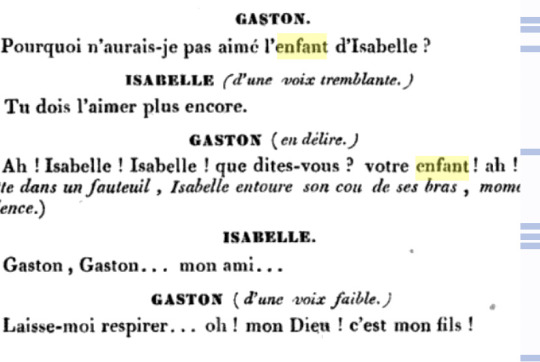
#for those of you unfamiliar: my crack theory about this opera is that arrigo not rolando is the father of lisa’s child#(gaston and isabelle are the source of arrigo and lida respectively)#opera tag#opera#la battaglia di legnano#the battle of legnano#verdi#giuseppe verdi#la bataille de toulouse#joseph méry#I AM (possibly? adaptations are weird) VINDICATED#aww fuck that first tag was supposed to say lida’s not lisa’s stupid autocorrect
9 notes
·
View notes
Text
Une bien jolie image, un peu trop oubliée, peut-être...
Je profite de l'Ascension pour vous parler d'un sujet que rien n'amène : la ''fuite en Egypte'' de la Sainte Famille, si bien racontée par Saint Marc. Tout enfant, déjà, je trouvais ce récit passionnant, tous les ingrédients du ''suspense'' y étant concentrés : une famille pauvre, le petit bébé à peine né, et le méchant roi voulant écarter un concurrent ''quoi qu'il en coûte'' y compris en tuant tous les petits garçons... Je me sentais concerné ! Il y a bien longtemps que j'avais envie de vous parler de ce sujet un peu ''en marge'' de l'histoire principale... que réveillait en moi, sans que je le recherche, chaque voyage en Egypte... ''Yallah !'' Je me jette à l'eau (du Nil)....
Rien, dans l'actualité, ne nous fait nous promener le long de ces eaux endormies, ces jours-ci... mais (Rappel) la ''nouvelle formule'' de ce Blog veut se détacher du lien répétitif de l'actualité, qui est ennuyeux à court terme, stérile à moyen terme... et certainement mortel à plus long terme, les choses étant ce que nous savons, hélas... Aujourd'hui, il ne s'agit donc que d'évoquer de jolis souvenirs qui refont soudain surface : ce sont les vraies racines de ce qui est important (donc détaché du quotidien)... et aussi d'un mail, reçu de l'un de mes amis égyptiens qui remet au premier plan (les psychologues disent ''plage éclairée'') cette page de mes rêveries solitaires et de mes travaux d'adulte --inutiles, mais qui me sont si chers.
Et pour commencer... ''de quoi s'agit-il'' ? Si l'on en croit Saint Mathieu (et pour quelle raison ne le croirait-on pas ?), peu après le départ des Mages, un ange serait apparu à Joseph (pas encore ''Saint'', évidemment) : il devait fuir la folie assassine d'Hérode. L'évangéliste précise ''Joseph prit l'enfant et sa mère et se retira en Egypte où il resta jusqu'à la mort d'Hérode'' (Mt 2, 13-15). Un calcul rapide fait donc durer ces vacances forcées près de quatre années, au terme desquelles ''L'ange dit : Joseph, lève toi, et pars vers le pays d'Israël, car ils sont morts, ceux qui en voulaient à la vie de l'Enfant''... Ces détails avaient un peu glissé sur moi, ''au Caté'', sans laisser trop de détails : l'important, à 12 ans, c’est le Quoi, pas le Comment.
Il a fallu que des années et des décennies plus tard, lors d'un pèlerinage (seul avec Evelyne, comme souvent) sur les chemins de Saint Paul, je me trouve par hasard dans un couvent perdu au bout de rien, Agios Gerasimos, où un vieil higoumène à la pilosité étonnante mais d'une propreté douteuse et à la culture insondable a tenu à me montrer ''l'endroit où l'enfant Jésus avait fait ses premiers pas''. J'ai beau me méfier ''XXL'' de certains aspects un peu ''fétichistes'' et ''folkloriques'' de la foi (par ailleurs riche et profonde) des églises d'Orient... j'ai été obligé de reconnaître que l'Enfant Jésus avait dû se soumettre à cette épreuve incontournable des ''premiers pas'' (''Viens voir Papa-Joseph... Non ! Debout, pas à quatre pattes, etc... Marie, viens vite voir le petit : il marche !''. Jésus ''En Marche'' ? J'avoue que je n'y avais jamais pensé !). Question suivante : à quel âge Jésus a-t-il quitté la Judée pour l'Egypte ? Sans doute très tôt... ce qui rend plausible l'épisode des ''premiers pas'' auxquels le catholicisme romain n'a jamais porté un grand intérêt. C'est dommage.
Plus tard, remontant le NIl à bicyclette (je vous rassure : pas en une seule fois, le trajet Alexandrie-Assouan s'étant étendu sur 4 ans !), nous avons été frappés par le nombre de ''souvenirs'' qui restent dans ce beau pays sur la présence ou le passage de la Sainte Famille après treize cents ans d'Islam ravageur et peu accommodant : les Béit Méry (''la maison de Marie''), ou les Ouadi Méry, (qui ont conservé la mémoire d’avoir ''vu'' la Sainte Famille boire là une eau qu'il faut espérer pas encore polluée). A ce Ouadi, ils se sont désaltérés... Ici, ils se sont arrêtés... Là, Joseph, ayant dépensé tout l'or offert par les Mages, a vendu l'âne... Dans telle grotte, ils ont séjourné, et sur telle berge, la Vierge Marie à lavé les langes de l'enfant (quand on y pense, ce n'est pas impossible, même probable !)...
Depuis le delta du Nil et le site de Matarieh --près de l'actuel Aéroport al-Qāhirah-- jusqu'à ma montagne de Qosqam où ils auraient séjourné 3 ans, des lieux, le long du chemin suivi, ont gardé le nom de Marie, et des églises ont été érigées, dès le IVè siècle. Il existe aujourd'hui une quarantaine de sites ''authentifiés'' par le très officiel Département d'Archéologie égyptien comme ''faisant partie du chemin emprunté par la Sainte Famille''. Les Coptes (ces seuls descendants des antiques ''égyptiens des temps pharaoniques'', les arabes étant, là comme ailleurs, des conquérants colonialistes qui ont réécrit l'Histoire comme ça les arrangeait --une des pires mystifications de tous les temps !) pérégrinent là par centaines de mille...
A la différence de l'Eglise romaine, comme toujours frileuse et très ''en retrait de la main'' sur tout ce qui risque de faire froncer les sourcils politiquement corrects des modernistes qui, pourtant, la haïssent (mais pas ceux de SS Benoît XVI, ni ceux de toute la hiérarchie de l'Eglise copte --ce qui n'est pas rien comme références, sur un tel sujet !), aucun des égyptiens à qui j'ai pu en parler (au total, ça fait beaucoup !) n'aurait l'idée de mettre en doute le récit de Saint Matthieu. Le 1er juin est la date retenue pour commémorer officiellement l'entrée en Egypte de Joseph, Marie, l'Enfant-Jésus et Salomé, une cousine de Marie, date qui va bientôt être déclarée fériée, en Egypte (le processus est engagé). Et c'est le 1er juin de l'année dernière que SS Tawardos II, 118 ème Patriarche copte-orthodoxe (qui représente dans les 12 % des cent millions d'égyptiens dont une grande majorité respecte tous ces lieux vénérables -- et donc vénérés), déclarait : ''Dieu nous a donné cette bénédiction : cet événement a eu lieu sur la terre de notre cher pays. Il faut nous en réjouir''.
Le ministère du tourisme (dont certaines motivations doivent un peu ''sentir le besoin de cash'' !) a inauguré --en plein ''covid''-- un ''Chemin de la Sainte Famille'' dont la longueur finale devrait être de plus de 350 km, qui reliera les lieux les plus emblématiques, tel le village de Maadi où Joseph se serait ''délesté'' d'une partie de l'or des Mages pour ''acheter'' la remontée du Nil, ou le site de Sakha où une pierre est vénérée comme ''portant trace des petits pieds du Christ'' (NDLR : moi, je veux bien ! S'ils le disent ! L'empreinte est assez floue) jusqu'au monastère de Deir al-Muharraq, qui est dit ''le plus ancien monastère du monde'' (ce qui serait logique s'il est bâti sur l'emplacement de la maison où habita le Christ encore tout bébé !).
J'espère que cette petite escapade dans l'un des événements les moins ''célébrés'' de toute l'histoire chrétienne (et de toute l'Histoire, de manière plus générale) vous aura permis, chers Amis-lecteurs, d'oublier pendant quelques minutes la pression si laide de notre sinistre quotidien, et de découvrir ou de revisiter plusieurs ''grandes premières'' de notre culture : le premier voyage touristique, déjà payé ''à prix d'or !'', les tout-premiers ''gîtes d'étape'' et les ''bed and breakfast'', la première croisière en felouque sur le Nil, le premier emplacement du ''club Med'' sur la montagne de Qosqam, ou une de toutes premières de ces ''migrations forcées'' qui détruisent le monde actuel... et aussi : le bien joli récit des premier pas d'un bébé sur le sol qu'avaient quitté ses ancêtres 1500 ans plus tôt... Mais c’est une autre Histoire...
H-Cl
2 notes
·
View notes
Text
Charming Cat Quotes for You

“God made the cat to give man the pleasure of stroking a tiger.” — Joseph Méry
“I love them, they are so nice and selfish. Dogs are TOO good and unselfish. They make me feel uncomfortable. But cats are gloriously human.” — L.M. Montgomery
“All cat stories start with the statement: ‘My mother, who was the first cat, told me this…'” — Shirley Jackson
“One reason that cats are happier than people is that they have no newspapers.” ― Gwendolyn Brooks
0 notes
Text
This agreeable piece of pseudo-Medieval/folk music is from a 19-century Italian opera set to a French text (by Joseph Méry and Camille du Locle, but sung here in an Italian translation by Achille de Lauzières and Angelo Zanardini), based on a German play (by Friedrich von Schiller) about Spanish history. The ultimate in anti-nationalism and anti-tribalism! No wonder opera is under attack from both the right and the left!
This sequence introduces us to Princess Eboli, who comes across as very charming here, but is actually up to no good.
0 notes
Photo
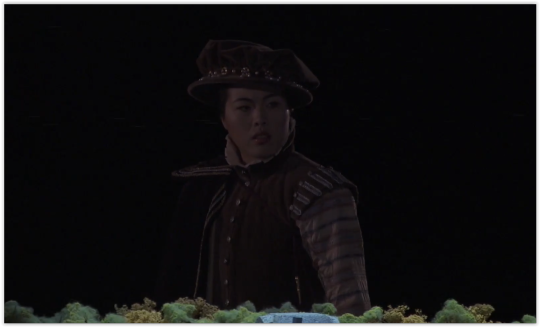
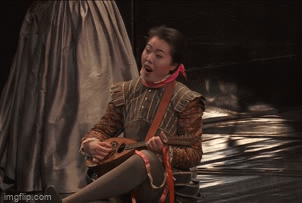
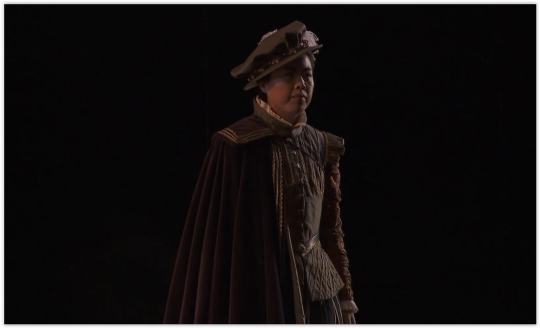
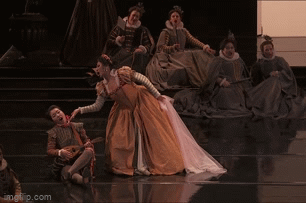
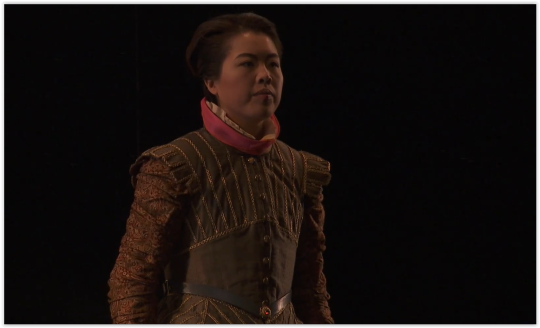
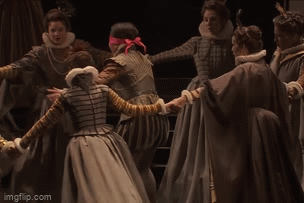
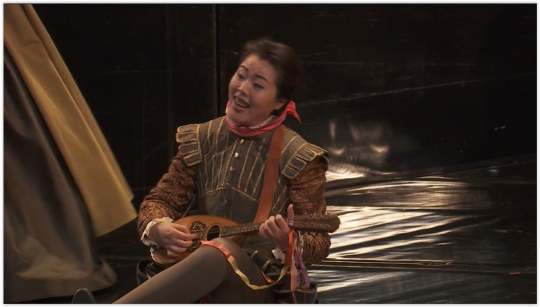
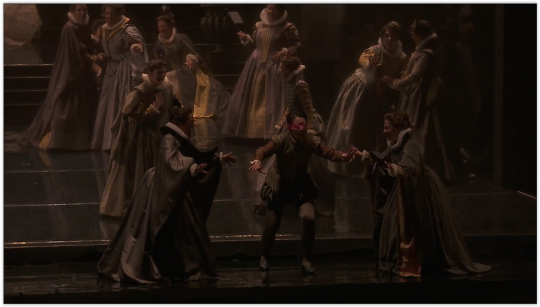
Nian Wang as Tebaldo in Verdi’s Don Carlo
(San Francisco Opera, 2016)
#Nian Wang#Tebaldo#San Francisco Opera#Don Carlo#Giuseppe Verdi#Camille du Locle#Joseph Méry#mezzos#mezzo-soprano#trouser roles#Trouser Tuesday#opera#opera tag#opera gifs
34 notes
·
View notes
Text
Opera Simplified #1: Don Carlo(s)
Don Carlos (Don Carlo)
Opera Simplified #1
The Basics:
Music: Giuseppe Verdi
Libretto: Joseph Méry and Camille du Locle
Premiere: March 11, 1867; Salle le Peletier (Opéra national de Paris); Paris, France
Based on: Friedrich Schiller’s 1787 play Don Carlos, Infant von Spainen (Don Carlos, Infante of Spain)
Setting: Various locations in France and Spain; the late 1550s-early 1560s.
Characters:
Don Carlos (Don Carlo), Infante of Spain- tenor
Élisabeth de Valois (Elisabetta di Valois), Princess of France and Carlos’ fiancée- soprano
Philippe II (Filippo II), King of Spain and Carlos’ father- bass
Rodrigue (Rodrigo), Marquis de Posa- baritone
Princess Éboli, a Spanish noblewoman- mezzo-soprano
The Grand Inquisitor, head of the Spanish Inquisition- bass
A Monk- bass
Count Lerma, a Spanish nobleman- tenor
Thibault (Tebaldo), Élisabeth’s page- soprano
A celestial voice- soprano
Countess d’Aremberg, a lady-in-waiting to Élisabeth- silent
A royal herald- tenor
Note: This Opera Simplified will use the Italian names (which appear in the parentheses above), as this opera is performed much more often in Italian than French, even though the opera was originally written in French as a French grand opéra.
Requested by: @monotonous-minutia. (Also, thank you for reading over this!)
The Opera:
Act I:
Late winter of 1559, in the forest outside the Fontainebleau palace in southwestern France. A group of French woodcutters, their families, and other poor people are sitting around trying to keep warm.
**The People: WINTER SUCKS IT’S SO DARN COLD LIFE SUCKS
A Woodcutter: Don’t worry! When peace comes, everything will be better!
The People: YEAH BUT WHEN WILL THIS STUPID WAR EVER END***
*Hunting horns sound in the distance.*
HEY THE ROYAL COURT IS COMING THROUGH WE HOPE THEY HAVE HAPPINESS AND SUCCESS AND STUFF
The Hunters: C’mon, let’s go get the deer before they run off too far away for us to get them!
*Elisabetta di Valois enters with Tebaldo and a group of servants.*
The People: OH MY GOD IT’S PRINCESS ELISABETTA SHE’S SO NICE MAYBE SHE CAN HELP US
Elisabetta: Friends, how can I help you today?
The Women: Nothing for us, but do you see her?
*They indicate one of their own.*
She lost her husband, her two sons are off at war, she has nothing and no one…
Elisabetta: Say no more. Here, take this gold chain…
*She takes off a gold chain and hands it to the woman.*
Everyone, keep heart! A Spanish envoy is coming to talk about a peace treaty, and I’m confident that this war will end soon and France will see bright days again.****
The People: YAAAAAAY WE LOVE YOU ELISABETTA MAY GOD BLESS YOU
*She greets everyone and then leaves with her retinue. As they leave, Don Carlo shows up and hides among the trees.*
The Hunters: C’mon, let’s go get the deer before they run off too far away for us to get them!
The People: Once we have peace, everything will be okay again…
*They gradually leave. Once they’re gone, Carlo comes out of his hiding place.*
Carlo: Wow, Fontainebleau really is a huge forest…but it was here I saw Elisabetta for the first time just now…AND I’M IN LOVE! This was so worth leaving Spain in disguise and having Dad get very mad at me!
*Horns and footsteps sound in the distance.*
Oh, wow, the court’s still here even though it’s getting kinda late…
Tebaldo (from offstage): HEY PEOPLE COME HERE WE KINDA NEED HELP
Carlo: Who’s there?
*Tebaldo enters with Elisabetta.*
whaaaaaaaaaaat it’s Elisabetta again YAAAAAAAAAY
Tebaldo: I CAN’T FIND THE WAY BACK I’M SO SORRY ELISABETTA IT’S GETTING DARK AND COLD LET ME HELP YOU
Elisabetta: Thanks, I am kinda tired…
Carlo: Hello!
*He bows before Elisabetta.*
Tebaldo: uhhhhhhhhhhh who are you
Carlo: A stranger, a Spaniard, and I won’t say anything more.
Elisabetta: Oh, so you’re with Count Lerma, that Spanish ambassador?
Carlo: ...yeah. I’ll help you if you need.
Tebaldo: HEY ELISABETTA I CAN SEE THE PALACE FROM HERE LEMME RUN AND GET SOME PEOPLE TO BRING YOU BACK
wait actually I can’t just leave you alone with this strange guy what if he tries to hurt you or do something to you
Elisabetta: IT’S OKAY I TRUST SPANISH HONOR BECAUSE I KNOW THE SPANISH ARE REALLY BIG ON HONOR AND STUFF WHICH WILL TOTALLY NEVER BE A PROBLEM FOR ME SO THIS GUY AND I SHOULD BE OKAY DON’T WORRY ABOUT ME
*Tebaldo bows and leaves. Carlo himself suddenly kneels before Elisabetta.*
What are you doing?
*Carlo lights a small pile of branches on fire to create some warmth for himself and Elisabetta.*
Carlo: Well, we’re all stuck outside, especially considering there’s a war going on right now, so we might as well light some fires, and have light, and stay warm, and maybe even have peace and love…
Elisabetta: Speaking of which, do you think they’ll sign the treaty tonight?
Carlo: Of course! And then they’ll announce your marriage to Don Carlo of Spain—
Elisabetta: Let’s talk about him! Here’s the thing: I’m leaving my home, my whole life up until now behind forever to marry this guy because my father and God want me to, and tbh I’m a little afraid. Like what if I get homesick? Or if he doesn’t love me?
Carlo: I know this much: he wants to serve you forever and he already loves you.
Elisabetta: Whoo, good, I was worried. That makes me feel a lot better about going to Spain.
Carlo: You have no reason to worry; he really, really loves you.
Elisabetta: Why do I feel so weird about you saying this?
…Wait. Who are you?
Carlo: A messenger to the man himself.
*He hands her a small box.*
He asked me to give you this portrait of himself.
Elisabetta: *examining the box* I feel like I shouldn’t open this…but I really want to see him!
*She opens the box and looks at the portrait, then at Carlo, and then back and forth for a bit until she realizes. *
OH MY GOD YOU’RE DON CARLO?!?!?!?!
Carlo: *fainting at her feet* I am… and I really do love you!
Elisabetta and Carlo: YAAAAAY WE’RE IN LOVE AND GOD WANTS US HAPPY SO WE’RE GONNA GET MARRIED EVENTUALLY
*A cannon shot. The faraway palace lights up.*
Elisabetta: That was…
Carlo: IT’S THE CANNON THE PEACE TREATY HAS BEEN SIGNED *****
Elisabetta and Carlo: OHHHHHHHHHHHHHHHHH YEAHHHHHHHHHHHHHHHHHHHHH THAT’S AWESOME PEACE WILL BE SO GREAT AND THE WORLD WILL BE REBORN ALSO WE MADE A VOW HERE FOR FOREVER AND WE’LL OFFICIALLY BE MAKING VOWS SOON IN FRONT OF EVERYONE AND GOD WOOHOO
*Tebaldo, several other pages and valets, Count Lerma, the Countess d’Aremberg, and a bunch of other people show up. Tebaldo approaches Elisabetta, bows, and kisses the hem of her dress.*
Tebaldo: My sweet Elisabetta pleeeeeeeeeeeeeease take me with you when you go to Spain because I may or may not have a crush on you and really you’re just so awesome
Elisabetta: Of course! You can get up now, you don’t have to be so formal.
Tebaldo: Okay, cool. Now for the news. I salute you, Elisabetta, future Queen of Spain—
Elisabetta: Thanks. I appreciate that.
Tebaldo: —and wife of King Filippo II.
Elisabetta: WAAAAAAAAAAAAAIT A SEC I’m supposed to be marrying Don Carlo those were the terms of the peace treaty we already talked about this
Tebaldo: uh that changed you’re marrying Filippo now
Carlo: WAIT WHAT?!?!?!?!?!?!?!
Elisabetta: WHAT THE— wait I can’t finish that statement
well that’s it we’re done for my life is officially ruined but I’ll try to stick it out and keep my head up and fight fate anyway
Carlo: THAT’S IT WE’RE DONE FOR MY LIFE IS OFFICIALLY RUINED AND I’LL JUST HAVE TO BE DEPRESSED FOREVER NOW
Everyone Else: YAAAAAAAAAAAAAAY SPAIN’S GONNA HAVE AN AWESOME NEW QUEEN AND PEACE IS GONNA BE SO LIT
Elisabetta and Carlo: well our amazing lovely golden dream just got ripped to shreds and now all we have is sorrow
Count Lerma: My lady, your father wants you to marry Filippo as the price to end this war. However, Filippo wants the choice to be yours and yours alone. So, are you going to say yes to the dress? ******
The Women: PLEASE SAY YES HAVE MER—
Count Lerma: Shut up. It’s her choice.
Elisabetta: You say it’s my choice, but what choice do I have? If I say “no”, then the war will go on, and more innocent lives will be destroyed…
Count Lerma: Your answer?
Elisabetta: ...Yes.
The People: YAAAAAAAAAAAAAAAAAAAAAAAAY GOD BLESS YOU ELISABETTA
Elisabetta and Carlo: this is horrible I feel like I’m dying
Everyone Else: WE LOVE YOU SO MUCH ELISABETTA YAAAAAAAAY HONOR AND GLORY TO OUR NEW QUEEN
*Count Lerma leads Elisabetta to a litter and helps her get in. Everyone falls in line behind the litter and heads to the palace, merrily singing all the while.*
Carlo: MY LIFE IS OVER AND I WANT TO FREAKING DIE
Notes
Act II:
Scene 1:
An unspecified amount of time later, at a cloister in the monastery of San Yuste, with the tomb of Emperor Charles V. It is dawn. The monks are chanting, as one prays before the tomb.
Monks: Charles V is nothing but ashes, and his soul now trembles before God…
A Monk: CHARLES THOUGHT HE WAS SO COOL AND THAT HE COULD RULE EVERYTHING BUT IN HIS PRIDE HE FORGOT ABOUT GOD AND WAS THUS STRUCK DOWN SO LET THAT BE A LESSON TO Y’ALL
God, presumably from somewhere: ooooooooooooor it could mean that he was human and he died like every human does. just a thought. **
The Monk: WHAT WAS THAT ALSO GOD HAVE MERCY ON HIM
*Day dawns, all the monks leave, and Carlo enters, looking like he’s had...a very rough time of it.*
Carlo: I’VE BEEN HAVING SUCH A ROUGH TIME OF IT AND I CAME HERE TO FIND PEACE BUT IT’S NOT EXACTLY WORKING OUT
The Monk: We may try to find peace here, but even then suffering is always with us because we can only find peace in heaven…
Carlo: WAIT THAT SOUNDED LIKE MY GRANDPA AND HE LOOKED LIKE MY GRANDPA BUT MY GRANDPA’S DEAD I MUST BE REALLY LOSING IT
The Monk: We can only find peace in heaven…
*He leaves.*
Carlo: ahhhhhhhhhhhhhhhhhhhh why do I have so many problems
*Rodrigo, Marquis di Posa, Carlo’s…”best friend” according to most people, enters.* ***
Rodrigo: CARLO IT’S YOU I HAVEN’T SEEN YOU IN SO LONG
Carlo: OMG IT’S YOU RODRIGO LEMME HUG YOU
Rodrigo: I CAN’T BELIEVE I’M SEEING YOU AGAIN
Carlo: HEAVEN HAS SENT YOU TO ME
Rodrigo: MY BELOVED PRINCE
Carlo: MY CONSOLING ANGEL
Rodrigo: ALL THE HUGS okay look also the Flemish people need someone to save them and you should do it but wait are you OKAY CARLO YOU LOOK LIKE YOU’RE HAVING A ROUGH TIME OF IT SHARE YOUR PAIN WITH ME ****
Carlo: MY SAVIOR MY BROTHER LET ME CRY ON YOU
Rodrigo: POUR OUT YOUR TORMENT AND OPEN UP TO ME
Carlo: ...You really sure you want to know?
Rodrigo: Always.
Carlo: Very well. I love...and it’s a sinful love...Elisabetta!
Rodrigo: YOU’RE IN LOVE WITH YOUR STEPMOM?! (and you weren’t talking about me?!)
Carlo: nooooooooooooooooooooooooooooooooo Rodrigo are you abandoning me too???
Rodrigo: no no no it’s okay I still love you and since you’re suffering it’s my sole job to help you seriously I STILL LOVE YOU also has the King found out yet
Carlo: Surprisingly, no.
Rodrigo: Good. Then ask him to let you control Flanders. Kill two birds with one stone: help the Flemish and stop thinking about your stepmom.
Carlo: Will do.
*A bell tolls in the distance.*
Rodrigo: Hey, uh, the King and Queen will be here in just a little bit.
Carlo: ELISABETTA AHHHHHHHHHHHHHHHHHHHH
Rodrigo: CARLO PLEASE CALM DOWN but seriously stay by me and let me strengthen you and let God too because you have big things to do and I am fully confident in you
Carlo and Rodrigo: GOD YOU GAVE US HOPE AND LOVE SO GIVE US THE DRIVE TO FIGHT FOR FREEDOM ALSO WE VOW TO LIVE AND DIE TOGETHER AND WE’LL BE UNITED FOREVER
Rodrigo: Hey Carlo, don’t look now but—
*Filippo and Elisabetta enter with a bunch of monks.*
Carlo: AHHHHHHHHHH IT’S ELISABETTA I CAN’T EVEN SEE HER WITHOUT FREAKING OUT
Rodrigo: —they’re here. Have courage!
*Filippo and Elisabetta kneel at the tomb and then proceed offstage with the monks. While that is going on:*
Monks: Charles V is nothing but ashes, and his soul now trembles before God…
Carlo: I’ve lost her and she’s my dad’s wife now noooooooooooooooooooooooooo why does life have to suck so much
Rodrigo: hey hey stay by me your heart will be stronger that way
The Monk: GOD FORGIVE HIM
Carlo and Rodrigo: WE’LL LIVE AND DIE TOGETHER AND OUR LAST BREATH WILL BE A CRY FOR LIBERTY
*They embrace and then leave the monastery.*
Notes
Scene 2:
Later the same day, in a garden outside the monastery. Several ladies of the court and Tebaldo are hanging out and enjoying the day.
Ladies of the Court: it’s very hot out because duh it’s Spain and it’s hot but luckily there are a bunch of trees and some nice wind here
Tebaldo: IT’S SO PRETTY OUT HERE AND I LOVE IT
Ladies and Tebaldo: yaaaaaaaaaaay hanging out outside is fun
*Princess Éboli enters.*
Éboli: hey everyone since we can’t go inside the monastery and we have to wait out here for a long time would you all like to sing with me?
Ladies: YES YES YES ANYTHING FOR YOU ÉBOLI
Éboli: Cool! Hey, Tebaldo, since you’re so awesome at the mandolin why don’t you pull it out and play that one song about the veil?
Ladies and Tebaldo: YAAAAAAAAAAAAAAAAAAY
Éboli: SO this one time there was a Moorish king who was hanging out in a garden one night and he saw a pretty veiled woman and was like “hey baby you should be my new wife because I’m tired of my current one” lalalalala
Éboli, Tebaldo, and the Ladies: let’s weave some veils so we can find love at night lalalalala
Éboli: and THEN the king was like “oh hey you should take off your veil and let me see who you are and then we can be SUCH a great power couple” and then she did and IT WAS THE QUEEN AND HE WAS SO HUMILIATED AND IT WAS THE BEST THING EVER lalalalala
Éboli, Tebaldo, and the Ladies: the moral of the story is that wearing a veil at night is conducive to love so let’s all weave some veils lalalalala **
*Elisabetta enters from the monastery.*
Everyone: Your Majesty!
Éboli: She always seems so sad…
Elisabetta: I wish I could be as happy as all of them were…
Tebaldo: HEY THE MARQUIS DI POSA IS COMING HERE
Everyone Else: yaaaaaaaaaaaaaaaaaaaaaaay
*Rodrigo enters and goes over to Elisabetta.*
Rodrigo: Your Majesty, when I was in Paris, your mother gave me this letter for you.
*He hands her the letter along with a note.*
see that note please read that note because it’s very important and I’m asking you in the name of God so PLEASE read it okay I think I need to distract Éboli now so byyyyyyyyyyyyyye
Éboli: so what’s new in France, you cute thing?
Rodrigo: Everyone’s talking about this super-awesome jousting tournament. They say the King of France will be there! ***
Elisabetta: Should I read it? Should I not read it? Would reading it be infidelity? I mean, God knows I would never willfully commit adultery...fine. Read it.
“If you ever loved me, please trust the man who brought this note. -Carlo” that’s it?
Éboli: soooooooooooooooooooo are all the French ladies as pretty as everyone says they are?
Rodrigo: I think you’re lowkey flirting with me and I’m not sure how to handle it so I’m just gonna say that you’re one of the most beautiful and gracious ladies I’ve ever met and the ladies of France would do well to be as lovely as you
Elisabetta: Okay, Rodrigo, I’m pleased with you so I’ll give you one favor card to use at any time.
Rodrigo: Can I use it now on behalf of someone else?
Elisabetta: ...sure, I guess, you little self-sacrificer.
Éboli: Oh come on, why are you using it for someone else if you’re so worthy?
Elisabetta and Éboli: Who’s it for?
Rodrigo: Look: we all love Carlo, right?
Éboli: ...in what sense?
Rodrigo: You know what I mean. ;)
Éboli: CALLED IT so you’re the Gay Best Friend
Rodrigo: yeah. What’s it matter?
Éboli: I may or may not have had a bet going on it. ****
Rodrigo: ANYWAY we all love Carlo and he’s suffering and if he had a private meeting with you that would REALLY HELP
Éboli: y’know, one day I saw him while I was with Elisabetta and he started freaking out when he saw us so that OBVIOUSLY means he loves me but he keeps trying to hide it and idk why
Elisabetta: I feel like I’m gonna diiiiiiiiiiiiiiiiiiiiiiiiiiiiiiiiiiiiiiiiiiiiiiie
Rodrigo: PLEASE HELP CARLO
Elisabetta: Very well. Everyone out. Send Carlo in.
*Everyone else leaves and Carlo enters.*
Carlo: I need to ask my Queen for one thing. Please intercede with the King on my behalf and get him to allow me to go to Flanders because I cannot stand it here.
Elisabetta: I can arrange that, my son.
Carlo: nooooooooooooooooooooo don’t call me that because it reminds me that we were happy for one day and then everything shattered
At least you could say SOMETHING but noooooooooooooooooooooo you’re like cold dead marble
Elisabetta: look buddy I’m just following my duty and honor
Carlo: just LISTENING to your voice makes me happy
Elisabetta: Carlo, I would love to be beside you more than anything…
Carlo: YAAAAAAAAAAAAAAAAAAAAAAAAAAAY YOU STILL CARE ABOUT ME ISABELLA I WOULD DIE AT YOUR FEET *****
*He faints.*
Elisabetta: HEAVEN HELP HIM BECAUSE OTHERWISE HE’S GONNA DIE IN MY ARMS
Carlo (delirious): ELISABETTA EVERYTHING IS BECOMING BEAUTIFUL AGAIN IT’S YOU MY LOVE
Elisabetta: OMG HE’S DYING
Carlo: WHY DO I HAVE TO COME BACK TO REALITY
Elisabetta: CARLO CAN YOU HEAR ME CARLO
Carlo: EVEN IF GOD HIMSELF WERE TO STRIKE ME DOWN I LOVE YOU AND I’VE FORGOTTEN EVERYTHING ELSE
Elisabetta: FINE THEN GO KILL YOUR FATHER AND THEN YOU CAN MARRY ME WHILE COVERED IN HIS BLOOD
Carlo: WHAT NO I MUST BE CURSED
*He flees.*
Elisabetta: ...thank God.
*Tebaldo runs in.*
Tebaldo: ELISABETTA WE’RE ABOUT TO HAVE A MAJOR PROBLEM THE KING IS HERE I DON’T WANT ANYTHING BAD TO HAPPEN TO YOU BUT—
*Filippo enters with Rodrigo, Éboli, and a bunch of other court people.*
Filippo: THERE IS A RULE THAT SAYS AT LEAST ONE LADY-IN-WAITING MUST BE WITH THE QUEEN AT ALL TIMES BECAUSE I SAID SO SO WHO BROKE THE RULES
*The Countess d’Aremberg steps forward.*
You are going back to France tomorrow.
People of the Court: THAT’S A HUGE INSULT TO THE QUEEN
Elisabetta: Hey, listen to me. I know you’re getting banished but please don’t start crying on me, okay? You’re still with me in my heart and I still love you and you getting banished doesn’t change that one. bit. When you go back, my heart will go with you too.
*She gives her a ring.*
I’m not proposing, but this is still a token of how much I love and admire you. Take it, and whatever you do, do NOT tell anyone about how badly they’re treating me here. I wouldn’t want them to worry about me.
Filippo: Humph. What an actress.
Rodrigo and the Court People: SHE’S SO WONDERFUL
*Everyone starts to leave except Filippo, but as Rodrigo is about to go:*
Filippo: You, Rodrigo, stay.
*Rodrigo doubles back.*
Why have you never asked to see me? You’re a loyal man and I’d be more than happy to see you if you asked.
Rodrigo: Well, no offense, but I’m not much into following others’ caprice and what could I possibly need? I’m perfectly fine as is.
Filippo: A bold one, I see! I can forgive that...but not always. Anyway, you’re a soldier, and an outstanding one, I’ve heard. Don’t you want to fight?
Rodrigo: When Spain needs a fighter, I will fight.
Filippo: I know. So the big question is: what can I do for you?
Rodrigo: For me? Nothing. For others…
Filippo: wait wait wait. “For others?” what kind of self-sacrificer are you?
Rodrigo: If you’re not too angry, I’ll tell you.
Filippo: Very well. Speak freely.
Rodrigo: I just came back from Flanders, and you know as well as I that Flanders is a beautiful place. Well, it was. Now it’s horrible. I MEAN ORPHANS ARE WANDERING THE STREETS AND CHILDREN ARE BEING KILLED AND EVERYTHING’S ON FIRE AND THE RIVERS ARE RUNNING RED WITH BLOOD and thank GOD I’m able to tell you about all this because who else will?
Filippo: Look, blood is the price for peace! We can’t have the Flemish trying to rebel with their newfangled delusions of independence and their Protestantism and whatever the kids are all into nowadays. This will all lead to a brighter future.
Rodrigo: ...You really think that will work?
Filippo: It already works in Spain! Everyone here is faithful to God and to me, and they’re doing just fine. I’m offering the same terms to Flanders and it’s not my fault they’re not accepting the peace.
Rodrigo: A HORRIBLE PEACE THE PEACE OF THE TOMB
*Music: DUUUUUUUUUUUUUN-DUNNN-DUNNN-DUUUUUUUUUUUUUUUN-DUUUUUUUUUUN. Closeup on Filippo at this point optional.* ******
My King, may history never say of you: “He was a Nero!”
*And then Rodrigo really goes off.*
So this is the peace you want to give the world? A peace where soldiers and priests are pitiless murderers? A peace where so many people are dying that everyone curses you? Look, you have the power to redeem it all and become the best king ever: all you have to do is give them freedom. GIVE THEM FREEDOM
Filippo: Oh...you strange dreamer. You’re young and idealistic, you have no idea. If you did, you would change your mind. Don’t worry, though, I will not hold this against you; I’ll simply forget everything you said. But beware the Grand Inquisitor. He will not be so forgiving.
Rodrigo: But—
Filippo: You still have not asked me for anything? Let me ask you for something: I want to have you by my side, which may entail...several different things.
Rodrigo: With all due respect, my answer remains the same: I’m fine as is.
Filippo: NO YOU’RE TOO PROUD AND YOU’VE SEEN MY VULNERABILITY AND MY ANGUISH BECAUSE MY SON IS A DISAPPOINTMENT AND I’M PRETTY SURE MY WIFE AND HIM ARE HAVING AN INCESTUOUS AFFAIR *******
Rodrigo: WHAT NO THEY WOULD NEVER ESPECIALLY NOT CARLO HE IS PURE
Filippo: I need you to find out what’s going on. Effective immediately, I grant you free access to the Queen at all times. I’m placing my heart in your hands.
Rodrigo: uhhhhhhhhhhhhhhhhhhhh what’s happening what about Carlo WAIT I COULD USE THIS TO MAYBE CHANGE HIS MIND ABOUT FLANDERS
Filippo: I hope that you can help me find peace…I’ve been looking for a man for a long time, and now I found him in you...
Rodrigo: THIS IS MY CHANCE THERE IS HOPE
Filippo: It’s worth saying one more time: Beware the Grand Inquisitor!
*He extends his hand to Rodrigo, who kneels and kisses it.*
Rodrigo: My King!
Notes
Act III:
Scene 1:
The gardens of the royal palace in Madrid, shortly before midnight. There is a party going on in the distance.
Partygoers: WOOHOO WE LOVE PARTIES WE WANNA PARTY ALL NIGHT LONG AND MAKE DAY NEVER COME WOOHOO
*Elisabetta and Éboli walk in together.*
Elisabetta: I mean, I love parties as much as the next person, but I’m just super worn-out and I kinda want to go pray instead.
Éboli: but parties are fuuuuuuuuuuuuuuuuuuun and everyone’s gonna be theeeeeeeeeeere
Elisabetta: And they’re expecting me, but I don’t want to go. Here, take all these accessories, take that veil, put it all on, and...perfect! They’ll never know it’s you instead of me. Have fun okay bye now
*She goes back into the palace.*
Éboli: ooh, playing queen for a night will be fun! WAIT while I’m wearing this veil I should get Carlo to come meet me in the gardens and ask him if he likes me this plan is FOOLPROOF
*She writes a note and gives it to a passing page.*
THIS WILL BE THE BEST NIGHT EVEEEEEEEEEEEEEEEEEEEEEER **
*She leaves.*
*At this point, the party continues with a ballet about the legend of La Peregrina as entertainment for the party guests.* ***
*Carlo enters, holding Éboli’s note— but the note is unsigned.*
Carlo: “Meet me at midnight in the royal garden under the laurels near the fountain.” Okay, I may not be the smartest person in the world, but it’s midnight, and I’m in the right place, so… ELISABETTA AHHHHHHHHHHHHHHHHHHHHH I GET TO SEE HER AGAIN I AM SO HAPPY
*Éboli enters in the disguise she got from Elisabetta. Carlo immediately mistakes her for Elisabetta.*
IT’S YOU I’M SO HAPPY TO SEE YOU I LOVE YOU SO MUCH
Éboli: so he DOES LOVE ME THIS IS THE BEST NIGHT EVER
Carlo: LET’S FORGET EVERYTHING I LOVE YOU
*Éboli unveils herself.*
wait WHAT oh God no it’s not the Queen!
Éboli: ...are you okay? wait...do you not trust me? look you can trust me I know people are trying to plot against you
Carlo: I KNOW THAT THAT’S NOT THE PROBLEM HERE
Éboli: y’know, I heard your dad and Rodrigo talking about you
Carlo: you WHAT my dad with RODRIGO
Éboli: I CAN SAVE YOU I LOVE YOU
Carlo: Look, you are very nice and I’m thankful for your help but I’m afraid this is all just a strange dream—
Éboli: A DREAM?!?!?!?!?! Wait, so you didn’t know this was me, so you’re not actually in love with me, which means—
OH MY GOD YOU’RE IN LOVE WITH THE QUEEN WHAT THE FUCK
Carlo: god DAMN it PLEASE HAVE MERCY
*Rodrigo runs in because...he happened to be taking a walk or something I guess.*
Rodrigo: HEY STOP IT HE’S CRAZY Carlo I’m saying that for your own good I know you’re probably not actually crazy
Éboli: I KNOW EVERYTHING SO HE’S SCREWED
Rodrigo: what do you MEAN
Éboli: Let me put it this way: I know all his cards. I also know all your cards: you are the king’s favorite. However, neither of you know mine.
Rodrigo: but what do you MEAN by all this
Éboli: Nothing, just that Carlo’s fate is now entirely in my hands.
Rodrigo: WHY DID YOU COME HERE
Éboli: I’M NOT TELLING
Rodrigo: BUT CARLO IS INNOCENT AND SO GOD WILL DEFEND HIM AND SMITE THE LIVING HELL OUT OF YOU
Éboli: FINE SMITE AWAY but may I remind you that hell hath no fury like a woman scorned
Carlo: I’M SO STUPID I’VE RUINED ELISABETTA’S LIFE and also possibly my own but it was a huge mess anyway so yeah ONLY GOD CAN BE MY JUDGE NOW
Éboli: OH I SEE HOW IT IS ELISABETTA WANTED TO ACT ALL HOLY AND STUFF TO HIDE THE FACT THAT SHE’S HAVING AN AFFAIR
Rodrigo: YOU HAVE CROSSED A LINE AND I WILL KILL YOU FOR IT
Carlo: RODRIGO DON’T
Rodrigo: I THOUGHT I WAS SUPPOSED TO BE THE ONE TELLING YOU DON’T
Carlo: RODRIGO DON’T
Éboli: I’M WAITING FOR YOU TO KILL ME
Rodrigo: HOW ABOUT NOPE
Éboli: WHY NOT
Rodrigo: because I’m going to leave all this up to God because that’s my only hope at this point
Éboli: I WILL HAVE MY REVENGE AND THE EARTH WILL SWALLOW YOU UP ALIVE CARLO
Rodrigo: IF YOU TELL THEN GOD HIMSELF WILL SMITE YOU
Carlo: SHE KNOWS EVERYTHING
Éboli: THIS IS THE WORST DAY EVER
*She leaves.*
Rodrigo: hey Carlo if you have any important papers about Flanders on you give them to me I need them for something
Carlo: ...to you? to the confidant of the King?
Rodrigo: you really suspect me? ME? your boyfriend?
Carlo: NO I LOVE YOU AND YOU ARE MY ONLY HOPE HOW COULD I HAVE EVER DOUBTED YOU HERE TAKE THEM ALL
*He gives his papers to Rodrigo.*
Rodrigo: MY DEAR CARLO THANK YOU SO MUCH
Carlo: I ABANDON MYSELF TO YOU
*They fall into each other’s arms.*
Scene 2:
The following day, in the square before the Church of Our Lady of Atocha in Madrid. Preparations are being made for an auto-da-fé. Guards are trying to hold the people back as bells ring everywhere.****
People: WHAT A DAY WHAT A DAY FOR AN AUTO-DA-FÉ WHAT A SUNNY SUMMER SKY WHAT A DAY WHAT A DAY FOR AN AUTO-DA-FÉ IT’S A LOVELY DAY FOR DRINKING AND FOR WATCHING PEO— wait never mind that’s the wrong auto-da-fé song start over *****
TODAY IS AWESOME BECAUSE WE GET TO CELEBRATE FILIPPO WHO IS THE GREATEST KING EVER AND WE ALL LOVE HIM AND THE WORLD TREMBLES BEFORE HIM AND ALSO WE LOVE GETTING TO BURN PEOPLE
*A bunch of monks lead those condemned by the Inquisition as heretics across the square.*
Monks: TODAY IS THE FATAL DAY WHERE THE HERETICS WILL DIE ACCORDING TO GOD’S JUST WILL but God will maaaaaaaaaaaybe forgive them if they repent of their heresy
People: YAAAAAAAAAAAAAAAAAAAAAAAAAAAAAAAAAAAAAAAAAAY
*An extremely long royal procession, including Elisabetta and Rodrigo, crosses the square towards the church.*
Royal Herald: OPEN UP CHURCH DOORS WE WANT TO SEE THE KING
People: WHAT HE SAID
*The doors open and Filippo leaves the church.*
Filippo: I PROMISED AS YOUR KING TO KILL ALL THE HERETICS AND I INTEND TO DO SO BECAUSE I’M NOT LIKE SOME LEADERS WHO FAIL TO KEEP THEIR PROMISES AND ARE SOFT ON CRIME
People: YAAAAAAAAAAAAAAAAAAAAAAAAAAAAAAAAAAAAAAAAAAY
*Carlo leads in six Flemish deputies, who kneel before the King.*
Elisabetta: OH SHOOT HE’S HERE
Rodrigo: uhhhhhhhhh what is he doing
Filippo: ...who are these people?
Carlo: They are representatives of Flanders and Brabant. ******
Flemish Deputies: Your Majesty, we may be suffering immensely, but we’re still here and we’re still a concern, so if you have ever received mercy, then please pass it along to us because all the Flemish people are suffering and maybe you could save us with God’s help!
Filippo: YOU ARE TRAITOROUS TO YOUR GOD AND KING SO NO GUARDS TAKE THEM AWAY
Monks: YEAH THEY HAVE NO FAITH IN GOD AND THEY DESERVE WHAT’S COMING TO THEM
Everyone Else: please be merciful and spare them have pity they’re suffering and dying
Carlo: DAD IT’S TIME THAT I LEARNED TO RULE BECAUSE I’M JUST SITTING AROUND HERE AND DOING NOTHING USEFUL SO IF I’M SUPPOSED TO RULE THE WHOLE SPANISH EMPIRE SOMEDAY THEN I MIGHT AS WELL HAVE SOME PRACTICE SO GIVE ME BRABANT AND FLANDERS
Filippo: ...do you think I’m so dumb as to actually do that?! YOU’RE JUST GOING TO LEAD THE FLEMISH REBELLION AND TRY TO KILL ME WITH THE SWORD I GIVE YOU
Carlo: ONLY GOD KNOWS WHETHER THAT’S ACTUALLY GOING TO HAPPEN
Elisabetta and Rodrigo: uh oh he’s done for
Carlo: I SWEAR BEFORE GOD THAT I WILL SAVE THE FLEMISH PEOPLE
*He draws his sword on Filippo.*
Everyone Else: WHAT THE ACTUAL HELL HE’S LOST HIS MIND
Filippo: DISARM HIM
*Awkward silence.*
I SAID SOMEONE DISARM HIM
Carlo: WHO WILL DARE DISARM ME
*Crickets.*
Filippo: IS NO ONE GOING TO DISARM HIM
*He takes the Captain of the Guard’s sword.*
FINE MEXICAN STANDOFF THEN
*Crickets.*
FOR THE LAST TIME SOMEONE DISARM HIM
Rodrigo: for God’s sake CARLO GIVE ME YOUR SWORD (I’m trying to save your life here)
Carlo: You? Rodrigo?
*He gives Rodrigo his sword. Rodrigo in turn gives it to Filippo.*
Everyone Else: ...oh shit. That was the twist of the year.
Filippo: Marquis, I now promote you to Duke!
*He dubs Rodrigo.*
NOW LET’S GO CELEBRATE
*Everyone goes to their places to watch the burning of the heretics.*
People: YAAAAAAAAAAAAAAAAAAAAAAAAAAAAAAAAAAAAAAAY EVERYONE LOVES FILIPPO except those Flemish people who are about to get burned but we don’t talk about them YAAAAAAAAAAAAAAAAAAAAAAAAAAAAAAAAAAAAAAY
Monks: TIME TO GO BURN SOME HERETICS
A Celestial Voice: You poor souls, come, come to heaven and find peace with God! *******
Deputies: GOD WHY AREN’T YOU DOING SOME SORT OF MIRACLE TO STOP THIS THEY CLAIM THEY’RE DOING THIS IN YOUR NAME
*The pyre is lit.*
The Voice: Though you have been condemned as heretics on earth, come and be forgiven!
Deputies: THESE FLAMES DO NOT COME FROM GOD
Filippo, Monks, and People: GLORY TO GOD ********
*The flames rise.*
Notes
Act IV:
Scene 1:
Shortly before dawn the following day, in Filippo II’s study. Filippo is alone, lost in thought.
Filippo: She never loved me...never has, never will...I still remember seeing her when she arrived, and she took one look at me and my white hair and her face fell...no, she does not love me!
HEY CELLO COULD YOU SHUT UP FOR A SEC I’M ALREADY HAVING TROUBLE SLEEPING AS IS
Solo Cellist In The Pit: but this is my big momeeeeeeeeeeeeeeeeeeent
Filippo: NO IT’S MINE AND I CAN’T SLEEP SO SHUT UP
*The cellist obliges and Filippo looks around.*
Where am I? wait...I’ve been up all night, it’s almost morning, the candles have almost burned out, just like my days slowly dwindling...dear God, I can’t sleep…
When my life has reached its evening, I’ll sleep forever, in my tomb, in the Escorial, I’ll sleep forever...alone… **
If only I could read human hearts like God could, that would give me peace, but if I sleep, then I could be betrayed and not know it and I could lose everything!
No, she has never loved me, she does not love me, she never will love me!
*Count Lerma and two Dominican friars lead in the Grand Inquisitor.*
Count Lerma: THE GRAND INQUISITOR IS HERE
Filippo: ...Dammit.
Grand Inquisitor: Am I before the King?
Filippo: Yes, thanks for coming, Father. I have a major problem: Carlo is rebelling against me.
Grand Inquisitor: So what are you gonna do about it?
Filippo: I don’t know; part of me just wants to let him go but part of me wants to…
Grand Inquisitor: Wants to…?
Filippo: Question: If I ordered Carlo’s execution, would you absolve me?
Grand Inquisitor: Yes.
Filippo; BUT I’M A CHRISTIAN HOW CAN I ORDER THE DEATH OF MY OWN CHILD EVEN FOR MY EMPIRE’S SAKE
Grand Inquisitor: ...You forgetting about Jesus?
Filippo: BUT THAT WAS ALMOST 1600 YEARS AGO
Grand Inquisitor: THAT DOESN’T MATTER
Filippo: BUT EVEN THOUGH WE’RE NOT ON GREAT TERMS AS A DAD I STILL LOVE MY SON CAN I JUST DENY THAT
Grand Inquisitor: Everything falls silent before faith.
Filippo: Very well.
Grand Inquisitor: Any other questions?
Filippo: No.
Grand Inquisitor: I’ll talk, then. Long story short: if you thought Carlo was bad, then you’ll be even more appalled to discover that a man, a close companion of yours, one you trusted, is ruining you and our country. And I have foolishly allowed it!
Filippo: But but but I’ve found a man!
Grand Inquisitor: What do you need a man for? No man is your equal!
Filippo: SHUT UP PRIEST ***
Grand Inquisitor: You’re trying to break apart the whole Catholic world! Normally, I’d condemn you for it, but I will relent on one condition: give us the Marquis di Posa.
Filippo: NEVER
Grand Inquisitor: FINE THEN I’LL HAND YOU OVER TO THE INQUISITION
Filippo: SHUT UP
Grand Inquisitor: WHY AM I EVEN HERE
Filippo: FINE DO WHAT YOU WANT but seriously I just want us to have peace please forget all this
Grand Inquisitor: Perhaps…
*He is led out.*
Filippo: So the throne must always give way to the altar!
*Elisabetta runs in, frantic.*
Elisabetta: JUSTICE I DEMAND JUSTICE AND I HAVE FULL FAITH IN YOU TO GIVE IT everyone here is treating me horribly and to TOP IT ALL OFF THE BOX WHERE I KEEP MY JEWELS AND OTHER PRECIOUS ITEMS HAS BEEN STOLEN
Filippo: Your jewelry box? You mean...this box?
*He reveals a box sitting on his table.*
Elisabetta: oh GOD no
Filippo: Open it.
Elisabetta: No.
Filippo: FINE THEN I WILL
*He breaks it open.*
Elisabetta: death in 3...2…
Filippo: YOU KEEP CARLO’S PICTURE IN HERE DO YOU HEAR WHAT I’M SAYING
Elisabetta: Loud and clear.
Filippo: You keep it...with your precious items?
Elisabetta: Yes.
Filippo: You DARE TO ADMIT THIS?!
Elisabetta: Yes! What do I have to hide? He was once my fiancé, and he gave me his portrait then, so what? Now I’m your wife, and I’m loyal to you. And you dare to insult and doubt me! Me! A princess of France, now the queen of Spain, me!
Filippo: HOW DARE YOU TO SPEAK TO ME SO BOLDLY YOU THINK I’M WEAK AND THAT YOU CAN DEFY ME BUT I’LL SHOW YOU AND EVERYBODY ELSE
Elisabetta: What did I do?
Filippo: If you have betrayed me, I swear to holy God above, I WILL HAVE BLOOD
Elisabetta: I pity you.
Filippo: Ha! Pity...FROM AN ADULTEROUS WIFE
*Elisabetta screams and faints.*
SOMEONE HELP THE QUEEN
*Rodrigo and Éboli immediately run in.* ****
Éboli: OH GOD WHAT HAVE I DONE
Rodrigo: You rule half the world. Are you the only person you cannot control?
Filippo: I shouldn’t have suspected her I fucked up and I’m very ashamed of myself now thanks whatever demon made me think this
Éboli: I RUINED HER LIFE I CAUSED THIS HORRIBLE THING I BETRAYED HER I FEEL AWFUL
Filippo: Looks like she was loyal all this time…
Rodrigo: Now I need to take action because someone needs to; a man needs to die for Spain to be saved, and so that man will be me.
Elisabetta (waking up): ...where am I? Everyone’s abandoned me...Mama, I just want to see you again...I’m a stranger here and all my hope in this world is gone… *****
Éboli: IF I CAN’T FIND FORGIVENESS ON EARTH OR IN HEAVEN FOR WHAT I’VE DONE I’LL JUST DIE BECAUSE WHAT I DID TO HER WAS ABSOLUTELY HORRIBLE
*Filippo and Rodrigo leave. Éboli throws herself at Elisabetta’s feet.*
FORGIVE ME ELISABETTA I DID SOMETHING HORRIBLE
Elisabetta: Why are you...what did you do?
Éboli: I FEEL HORRIBLE YOU ARE SUCH A GOOD PERSON AND I DID SOMETHING AWFUL TO YOU BECAUSE I GUESS I’M JUST A HORRIBLE PERSON
...I was the one who took the box and gave it to Filippo.
Elisabetta: You?
Éboli: YES ME I ACCUSED YOU BECAUSE I WAS SO PISSED OFF THAT CARLO LOVED YOU INSTEAD OF ME BECAUSE I REALLY LOVE CARLO BUT HE REJECTED ME
Elisabetta: You love him? It’s okay. Get up, you don’t need to beg for forgiveness at my feet.
Éboli: No...it gets much worse.
Elisabetta: What do you mean?
Éboli: PLEASE FORGIVE ME
okay so the thing is, I ruined everything even more because I accused you of committing adultery, but the truth is...I had an affair...with the King.
*Elisabetta (understandably) reels at this, but suppresses that and turns back to Éboli.*
Elisabetta: I gave you a crucifix once. Give it back.
*Éboli does so.*
You have twenty-four hours to choose between a convent and exile. Either way, I want you out of my court so I will never see you again. Be happy. Farewell.
*She leaves.*
Éboli: NO I’M NEVER GOING TO SEE HER AGAIN I MAJORLY FUCKED UP
MY BEAUTY YOU ARE SUCH A FATAL AND CRUEL GIFT FROM HEAVEN AND THE ULTIMATE SOURCE OF ALL MY PROBLEMS SO I CURSE YOU BECAUSE NOW ALL I CAN DO IS SUFFER AND I’LL NEVER BE ABLE TO FIX THIS
Elisabetta, my queen, I ruined you because I was so selfish and I’ll regret this for the rest of my life so I’ll just go into a convent and hide all my pain and suffering…
*She sees Carlo’s death warrant on the desk.*
OH GOD CARLO’S GOING TO BE EXECUTED TOMORROW NO NO NO wait WAIT A SECOND I HAVE ONE DAY LEFT HERE THERE IS HOPE THANK GOD I CAN AT THE VERY LEAST SAVE HIM BECAUSE I STILL LOVE HIM AND I HAVE ONE BLESSED DAY AND I WILL USE THAT DAY TO SAVE HIM
*She runs out.*
Notes
Scene 2:
Later the same day, in a nearby prison where Carlo is being held. He is sitting with his head in his hands. Rodrigo enters and talks briefly to the guards, who all leave.
Rodrigo: Carlo, it’s me.
Carlo: Thanks for coming to visit Carlo in prison.
Rodrigo: Stop referring to yourself in the third person, my dear Carlo.
Carlo: I’m useless for saving Flanders. I’m useless for EVERYTHING.
Rodrigo: NO YOU’RE NOT I LOVE YOU SO MUCH LET ME EMBRACE YOU I HAVE SAVED YOU
Carlo: How?
Rodrigo: I need to say farewell. Carlo, as much as it hurts to say this, and it’s a lot, we can never see each other again here below because my days have come to an end but I hope that we can see each other again and love each other when we are both with God...
Why are you crying? I’m happy to die for you!
Carlo: Why do you keep talking about death?
Rodrigo: WE DON’T HAVE MUCH TIME look the thing is I cleared your name and now they all think that I’m the one leading the rebellion
Carlo: Ha! Who’d ever believe that?
Rodrigo: Well, they have twenty of your papers found in my possession— **
Carlo: wait THAT’S WHY YOU ASKED ME FOR THE PAPERS?!?!?! Goddammit I AM SO STUPID
Rodrigo: shhhhhhhhh anyway that was more than enough proof and now there’s a price on my head
*A man in clerical garb and an assassin walk in (and no, this is not the start of a bar joke) and point out Rodrigo to each other.*
Carlo: I’LL TELL FILIPPO EVERYTHING HE’LL HAVE TO LET YOU GO
Rodrigo: No! It’s all up to you now; you must save Flanders and give it new life, and I must die for you.
*The assassin shoots Rodrigo at that moment.*
Carlo: OH MY GOD IT’S DEATH but...for whom? ***
Rodrigo: ...for me. The King’s revenge is swift. Listen.
Tomorrow, Elisabetta will be waiting for you at San Yuste. She knows everything and she will help you get out...I’m getting weak, Carlo, give me your hand!
I will die, but I’m happy because I’ve been able to save you and perhaps even by doing that save Spain! I’m so happy...but don’t forget me, Carlo, do not forget me! You were destined to reign and I to die for you!
No...no...the ground is giving way...I’m dying...Carlo...give me your hand...save Flanders...I love you, Carlo!...farewell...ah…
*He dies. Carlo collapses on his body as Filippo enters with his retinue.*
Filippo: HEY CARLO HERE’S YOUR SWORD BACK BECAUSE I GUESS YOU’RE NOT THE TRAITOR AFTER ALL
Carlo: STAY AWAY GOD HAS COVERED YOUR FOREHEAD WITH THIS INNOCENT MAN’S BLOOD
Filippo: MY SON—
Carlo: I’M NOT YOUR SON ANYMORE CHOOSE ONE FROM THESE MURDERERS BECAUSE YOU MURDERED THIS MAN WHO LOVED ME AND SACRIFICED HIS LIFE FOR ME IN SPITE OF EVERYTHING AND WE HAD ETERNAL UNBREAKABLE BONDS BETWEEN US AND MY KINGDOM IS WITH HIM
****Filippo: I might as well die because I killed the one good man God created in this world...me! I killed him! I loved him, he revealed a new world to me, and I threw him into the tomb!
Courtiers: Why should we go on living?
Carlo: MY LOVE SUPPORT ME AND LET ME BE THE HERO YOU ALWAYS WANTED ME TO BE AND LET ME HAVE SOME HELP FROM GOD OR AT LEAST PUT ME NEXT TO YOU IN THE TOMB ****
*The prison’s alarm bell sounds.*
People (outside): GET ‘EM WE WILL STRIKE ANYONE WHO OPPOSES US DOWN INCLUDING THE KING
Count Lerma: THE PEOPLE ARE RIOTING THEY WANT THE INFANTE
Filippo: OPEN THE PRISON GATES
Courtiers: WHAT THE HELL ARE YOU DOING
Filippo: did I STUTTER
*The crowd pours in.*
People: WE WANT THE INFANTE AND IF YOU DON’T GIVE IN WE’LL KILL YOU
*Éboli runs in, disguised as a page.*
Éboli: CARLO GO NOW
*Carlo escapes as Elisabetta enters.*
LOOK ELISABETTA I STARTED THIS WHOLE RIOT TO SAVE CARLO BECAUSE I LOVE HIM anyway I’m going to a convent now farewell forever
Elisabetta: oh my GOD WHAT IS HAPPENING
Filippo: YOU ALL WANT THE INFANTE YOU CAN HAVE HIM
*The Grand Inquisitor enters.*
Grand Inquisitor: SACRILEGE ABSOLUTE SACRILEGE
The People: oh SHIT
Grand Inquisitor: BOW DOWN BEFORE THE KING WHOM GOD PROTECTS
*Everyone else kneels.*
People: Dear Lord, forgive us…
Filippo and the Grand Inquisitor: GLORY TO GOD
Lerma, the Courtiers, and the People: Long live the King!
*Éboli collapses at Elisabetta’s feet. Elisabetta holds out her hands to her in a sign of forgiveness.* *****
Notes
Act V:
The following night, back before the tomb of Charles V at the monastery of San Yuste. Elisabetta enters, kneels at the tomb, and begins to pray.*
Elisabetta: I don’t know if you can hear me up there, Charles, but you knew the utter meaninglessness of all the vanities of the world and now you sleep so peacefully...so if souls still weep in heaven, then weep for me and bring my tears to God…
Oh boy, Carlo’s coming here...he must leave and I must watch over him from afar like I told Rodrigo I would...he must go find his glorious destiny while I can only wait to die…
France! My beautiful home...and Fontainebleau, the one place in the world where I was happy, where God heard my eternal vow of love, and that eternity lasted only a day…as for Spain, if Carlo should ever pass through these gardens again, may he hear songs of our love…
Farewell dreams, farewell hopes and illusions, farewell lost love, farewell youth, my heart only has one desire now: the peace of death!
Charles, if you’re still listening after all this, bring my tears to God!
*Carlo enters.*
Carlo: IT’S YOU
Elisabetta: I ask one thing of you: forget me and live.
Carlo: I want to be strong, but love…
Elisabetta: Think about Rodrigo! He didn’t just sacrifice himself for ideas, he sacrificed himself for Flanders and more importantly, for you!
Carlo: When I get to Flanders, I want to build a monument to him!
Elisabetta: Heaven will smile upon him!
Carlo: It once smiled upon me too and then vanished! But no more of that: I see all the horrors in Flanders he once talked about, and I see the people reaching out to me, begging me to help them...and I will help them!
Elisabetta: Yes, you will be a hero! Go, go save them with all my love and support behind you!
Carlo: You know, before today, nothing could have pulled me away from you, but now honor has triumphed and I feel so much stronger in my mind and my heart! Even though I may hold you, I still want to go to Flanders, and I will, and I will save the Flemish!
You’re crying?
Elisabetta: Just because I admire you and you are a hero. But you see, we will see each other again in a better world, and there we’ll finally be able to love each other and be happy as God wanted us to but we never got to…
Carlo: We’ll be happy as God wanted us to…
Elisabetta: But for now, we must say farewell.
Carlo: Farewell, Mother!
Elisabetta: Farewell, my son!
Carlo and Elisabetta: Farewell forever!
*Filippo suddenly enters with his retinue and the Grand Inquisitor and grabs Elisabetta’s arm.*
Filippo: YES FAREWELL FOREVER YOU’VE REALLY GONE AND DONE IT AND NOW I WANT A DOUBLE SACRIFICE AND I WILL DO MY DUTY
Grand Inquisitor: SO WILL THE INQUISITION
Elisabetta: OH GOD NO
Carlo: GOD WILL AVENGE ME AND SHATTER THIS TRIBUNAL OF BLOOD
*Suddenly, the tomb opens and the Monk reemerges.*
The Monk: We may try to find peace here but even then suffering is always with us because we can only find peace in heaven…
Grand Inquisitor: WAIT THAT’S CHARLES V’S VOICE
Filippo: OH GOD IT’S MY FATHER
Elisabetta: AHHHHHHHHHHHHHHHHHHHHHHHHHHHHHHHHHHHHHHHHH
*The Monk drags Carlo into the tomb.* **
Notes
The End
I hope you enjoyed this! PLEASE leave any and all suggestions in the comments, my messages, and/or my inbox! Thank you!
#opera#opera tag#opera simplified#Don Carlo#Don Carlos#Verdi#Giuseppe Verdi#Camille du Locle#Joseph Méry#French grand opéra
17 notes
·
View notes
Text
Exhaustive list of Valjean and Vautrin references in the diss so far
below the cut!
Valjean:
An 1866 Jesuit polemic against romanticism entitled Le vandalisme littéraire evokes sunlight in this curious denunciation of Jean Valjean: “C’est le sombre héros de cette sombre histoire, le forçat sur lequel on a appelé votre commisération, l’homme qui a usé le soleil du bagne.” The story and its protagonist are dark not in spite but because of the fact that the latter has “usé” (used, or worn out?) the sun which is not only associated with, but in a sense constitutive of, the bagne. Valjean was, of course, in Toulon—not Brest or Rochefort. Léon Faucher goes so far as to describe the bagne of Toulon as being “sous un ciel vraiment africain.” In Le dernier jour d’un condamné, the protagonist says that he would prefer the bagne to the guillotine, even for life, because at least a forçat “marche encore; cela va et vient; cela voit le soleil.”
The sun is not inherently tied to the bagne in this case, since it has been a leitmotif throughout the novella; however, it comes very à propos in a reference to the forçats which the condamné has seen earlier, since they were headed for Toulon, which is intimately linked to the sunlight. It is indeed Toulon that the condamné pines for, even if he does not know it himself; if he were to be sent to Brest, his days would instead be filled with a rain not unlike the one that falls on the day of his execution, or of the cadène’s departure. Similarly, Jean-Isidore Rous would almost certainly not have described Valjean as “l’homme qui a usé le soleil du bagne” if he had not been in Toulon.
Unlike Gustave, Valjean’s inability to appreciate “[le] soleil, ni [les] beaux jours d’été, ni [le] ciel rayonnant, ni [les] fraîches aubes d’avril” is not due to his aesthetics, but it nonetheless shows the limits of natural beauty in a bagne setting. “La nature visible existait à peine pour lui,” the narrator tells us; “Je ne sais quel jour de soupirail éclairait habituellement son âme.”
The bagne occurs as frequently in récits de voyage whose authors pass through Toulon, Brest or Rochefort as it does in exposés and reports that take it as a main subject; almost in spite of themselves, travelers saw the institution and its inmates as a tourist attraction, and were perhaps correct to do so––just as Jean Valjean was correct to fear especial infamy in Toulon because of his having being mayor in Montreuil-sur-Mer.
Another Jesuit, Jean-Isidore Rous, so wished to keep the bagnard at arm’s length that he could not even countenance an ex-convict between the pages of a book. Jean Valjean qua a hero and protagonist, he vituperates in the Les Misérables-focused chapter of the anti-Romantic tract Le vandalisme littéraire, is both an impossibility and an intolerable affront: “L’apothéose de Jean Valjean est la plus grande insulte qui ait jamais été faite à la société. Lavons-nous de cette boue comme nous pourrons, nous n’en aurons pas moins été salis. Type hideux d’une dépravation qui prend sa source dans la plus profonde immoralité, Jean Valjean secoue les plis de son manteau sur nous tous qu’il méprise. Il n’a pour nous, qui l’avons frappé avec les armes de notre justice, que des malédictions et des anathèmes.”
Even Victor Hugo, whose entire thesis hinged on the humanity of the downtrodden and degraded, emphasizes Valjean’s bestial and mechanical nature: hard labor transforms “peu à peu, par une sorte de transfiguration stupide, un homme en une bête fauve, quelquefois en une bête féroce,” and Valjean cannot help but follow the impulse to escape whenever the opportunity presents itself, “comme le loup qui trouve la cage ouverte.” Similarly, more than a beast of burden, Valjean is a human jack––nicknamed “Jean-le-Cric,” and able in a pinch to take the place of load-bearing statuary: “Une fois, comme on réparait le balcon de l’hôtel de ville de Toulon, une des admirables cariatides de Puget* qui soutiennent ce balcon se descella et faillit tomber. Jean Valjean, qui se trouvait là, soutint de l’épaule la cariatide et donna le temps aux ouvriers d’arriver.”** In context, these images serve as an indictment of society and of the penal system rather than of Valjean himself, but they still frame the victim as something less––but also sublimely more––than human.
*Footnote: These sculptures––which, being masculine figures who show apparent effort, are technically atlantes rather than caryatids––still exist, although the building to which they were originally attached does not. Much like the stained glass of Chartres Cathedral, they were removed from the Hôtel de Ville in anticipation of bombing during WWII and stored in a less exposed place. After the war, a new mairie (now a “mairie d’honneur,” with the real mairie moved across the street) was built in the same spot on what is now the Quai Cronstadt, and the atlantes/caryatids reattached. They and the original building and balcony are visible in the backgrounds of period paintings such as Joseph Vernet’s 1755 Troisième vue de Toulon, vu du Vieux Port, prise du du côté des magasins aux vivres (see Chapter 2 for a discussion of the relationship between forçats and the naval, urban, and natural landscape).
** Footnote: Émile Bayard furnished an illustration for this scene whose title, “Les deux cariatides,” emphasizes the equivalence between Valjean and this load-bearing sculpture. According to the tour guide and local historian Jean-Pierre Cassely, the two statues are allegorical, named “La Force” and “La Fatigue” but nicknamed “Mal au Dos” and “Mal aux Dents.” In Bayard’s illustration, Valjean is shown to be holding up a slightly larger-than-life-sized version of La Force.
In a sense, it is the healing, and not the trauma, that makes a brand truly permanent—scar tissue is a deeper structural change than an open wound, and thus the convict’s body is complicit in his degradation. The limp was a similar kind of adjustment, an acceptance of the new state of things. Of course, the chain existed for its own sake in a way that a branding iron did not, so the leg-dragging effect blurs the lines between a purposeful marking and an unintentional (but useful) side effect. Either way, the convict begins as a tabula rasa and ends indelibly sullied by his ordeal, having acquired a contaminating knowledge against his will. That is why it is so poignant that, while confessing his convict past to Marius towards the end of Les Misérables, Jean Valjean declares, “avec un accent inexprimable, ‘Je traîne un peu la jambe. Vous comprenez maintenant pourquoi.’” He is exposing himself completely to his son-in-law’s scorn, showing him a visible proof of his permanent degradation—after Toulon, even the way he walks is impure.
Joseph Méry uses the bonnet vert as sort of secondary synecdoche for hard labor for life, after the more obvious one of the casaque rouge for hard labor in general: “Ne savez-vous pas que l’irritation d’un moment, dans vos villes d’orages,” asks the convict protagonist of Le Bonnet Vert, “peut changer du soir au matin votre feutre noir contre un bonnet vert?” Hugo performs a similar maneuver in Les Misérables, as Jean Valjean is first identified as a convict because of his casaque and then as a convict for life because of his bonnet vert: “Tout à coup, on aperçut un homme qui grimpait dans le gréement avec l’agilité d’un chat-tigre. Cet homme était vêtu de rouge, c’était un forçat; il avait un bonnet vert, c’était un forçat à vie.”
He then adds a description of Valjean’s hair––an additional layer which is altogether outside the bagne’s symbolic system and is revealed in the same moment he is freed of the bonnet––and immediately decodes it as well: “Arrivé à la hauteur de la hune, un coup de vent emporta son bonnet et laissa voir une tête toute blanche, ce n'était pas un jeune homme.” Thus a bonnet vert denotes a lifer while a casaque rouge denotes a convict alone, and together with Valjean’s white hair they form the syntagm “old convict for life”*; these declarations set boundaries or expectations (he is unfree and thus impotent, he is old and therefore incapable) which are shortly transcended through grace and Valjean’s own prodigious ability.
*Footnote: It should be noted that Valjean’s clothing in the passage is both particular to its historical moment and in line with a partially contradictory gestalt imaginary. Statements like “all convicts wearing green caps are forçats à vie, all forçats à vie wear green caps, the casaque is entirely red, etc.” are incorrect when compared to the entirety of the historical record, but correct on a level that serves the story.
Like everything else, the actual shoes varied over time and from bagne to bagne; they could be wooden sabots, but they could also be souliers ferrés. In Les Misérables, Valjean, in a free indirect discourse, dreads the coming hardship of wearing such shoes (with no socks, a detail that may not be entirely accurate): “Si encore il était jeune! Mais vieux, être tutoyé par le premier venu, être fouillé par le garde-chiourme, recevoir le coup de bâton de l’argousin, avoir les pieds nus dans des souliers ferrés !”
Hugo evokes the cadène in two of its stages in Les Misérables: first the ritual of ferrage in the courtyard of Bicêtre, a solemn and tragic moment for Valjean in 1796; then the carnivalesque spectacle, in 1831, of the journey itself, which is witnessed both by an older Valjean (who has a flashback to 1796) and by Cosette (who is both disturbed and curious). This is the exact opposite of the treatment it is given in Le Dernier jour d’un condamné, where the initial ferrage is carnivalesque and the subsequent departure of the carts is a somber, rainy affair. In both cases, it is sunlight which stirs the convicts to action and provokes the grotesque: “Un rayon de soleil reparut. On eût dit qu'il mettait le feu à tous ces cerveaux. Les forçats se levèrent à la fois, comme par un mouvement convulsif [...] Ils tournaient à fatiguer les yeux. Ils chantaient une chanson du bagne”; “Brusquement, le soleil parut; l'immense rayon de l'orient jaillit, et l'on eût dit qu'il mettait le feu à toutes ces têtes farouches. Les langues se délièrent; un incendie de ricanements, de jurements et de chansons fit explosion.”
In Les Misérables, Valjean reacts with uncharacteristic joy when called “monsieur” by Bishop Myriel because “l’ignominie a soif de consideration”; related to the desire for consideration is a need for individuation.
A footnote: After his release from Toulon, a half-asleep Valjean is obsessed by the image of a fellow-convict’s checkered suspender: “[E]t puis il songeait aussi, sans savoir pourquoi, et avec cette obstination machinale de la rêverie, a un forçat nomme Brevet qu'il avait connu au bagne et dont le pantalon n'était retenu que par une seule bretelle de coton tricote. Le dessin en damier de cette bretelle lui revenait sans cesse à l'esprit.” The memory of this suspender allows Valjean to identify Brevet during Champathieu’s trial and to prove that he had known him in prison (and thus that he, not Champmathieu, is Jean Valjean): “Te rappelles-tu ces bretelles en tricot à damier que tu avais au bagne ?” Such is the importance of the detail which serves to identify and individualize the forçat.
The concept of the matricule number is mise en roman to particularly great effect in Les Misérables. Valjean’s prison number, his identité matriculaire so to speak, is woven into his character and narrative arc, and within the universe of the novel, form a traceable path through the bagne’s paperwork just as his aliases follow him through the twists and turns of the plot. Were he real, his second matricule entry would read “Jean Valjean, dit Madeleine,” and his first entry would forward the reader to his new one, hypertextually: “revenu sous le numéro 9430.”
Jean Valjean’s return to Toulon and arrival in Montfermeil are both framed as numerical substitutions or transformations—the first is a simple change of name and state, and the second an act of prestidigitation in which the same number magically takes on new powers. The chapter in which the reader is informed that Valjean is once more a prisoner (“Le 24601 devient le 9430”), and that in which he is revealed to be Cosette’s mysterious benefactor (“Le numéro 9430 reparaît et Cosette le gagne à la loterie”), share a number of structural parallels. Both refer to Valjean’s prison number (and Valjean as number); one is the first chapter of the sub-volume in which it appears (Livre Deuxième, Le Vaisseau l’Orion) while the other is the last chapter of the following sub-volume (Livre Troisième, Accomplissement de la Promesse Faite à la Morte), thus bookending the contents of both; and the chapters themselves consist of short, dialogue-free recapitulations, both opening with a drastic update regarding Valjean’s coordinates vis a vis freedom and captivity (“Jean Valjean avait été repris”) or life and death (“Jean Valjean n'était pas mort”).
“Le 24601 devient le 9430” introduces a setback that later turns out to be the setup for remarkable, even miraculous events. The reader sees Valjean apprehended (“repris”) and misapprehended as well (“Il a été établi, par l’habile et éloquent organe du ministère public, que le vol avait été commis de complicité, et que Jean Valjean faisait partie d’une bande de voleurs dans le Midi”), even being sentenced to death before being granted a royal commutation. He is condemned to spend the rest of his life in the bagne and his reintegration into the system seems to both proclaim and ordain this, his new address within the bureaucracy (“Jean Valjean changea de chiffre au bagne. Il s’appela 9430”) implying an existential imprimatur similar to the “pouvoir de faire ou, si l'on veut, de constater des damnés” that, according to Hugo, Javert and other “esprits extrêmes [...] attribuent à la loi humaine.” The inhabitants of Montreuil-sur-Mer, too, are the victims of this (con)damnation, as the sentence immediately following Valjean’s immatriculation shows: “Du reste, disons-le pour n’y plus revenir, avec M. Madeleine la prospérité de Montreuil-sur-Mer disparut ; tout ce qu’il avait prévu dans sa nuit de fièvre et d’hésitation se réalisa ; lui de moins, ce fut en effet l’âme de moins [emphasis in original]” (citation). Cosette would be yet another victim if it were not for Valjean’s determination and near-superhumanity. While coming to the aid of a sailor, he appears to drown, only to be resurrected in “Le numéro 9430 reparaît et Cosette le gagne à la loterie.”
The reader can guess, of course, that the stranger in “Cosette côte à côte dans l’ombre avec l’inconnu,” the mysterious “homme à la redingote jaune,” is none other than Jean Valjean, just as they were never really in doubt about the identity of Monsieur Madeleine; nonetheless, it is this chapter that names him, and in so doing closes the file that was opened with “Le numéro 24601 devient le numéro 9430.” Furthermore, the comparison to a winning lottery number underscores the miracle of Valjean’s escape, and ties what is otherwise a dehumanizing anti-name to fate and fortune in a positive sense. It is qua 9430 that Cosette’s rescuer (re)appears, both in contrast to a name, and in contrast to 24601, whose escape attempts were never successful. Madeleine desires to save Cosette; 9430 accomplishes the deed.
Vautrin:
Balzac and the penal reformer Benjamin Appert share Alhoy’s assessment of Rochefort’s lethality: in Splendeurs et misères des courtisanes, Vautrin tells his accomplice and lover Théodore Calvi, alias Madeleine, “S’ils nous ont déjà ferrés pour Rochefort, c’est qu’ils essaient à se débarrasser de nous”––a sentiment shared by the narrator: “[C]ette superbe évasion avait eu lieu dans le port de Rochefort, où les forçats meurent dru, et où l’on espérait voir finir ces deux dangereux personnages”––and Appert writes, “La mortalité est plus considérable à Rochefort que dans les autres bagnes. Mais on ne doit attribuer ce funeste résultat qu’au climat, et aux changemens fréquens de la température, puisque, pour les hommes libres, la même différence existe entre la mortalité de Rochefort, et celle de Toulon, Brest et Lorient.”
Accouplement exposed the convict to very real risks of physical and sexual abuse and/or assault, but the specter of homosexuality preoccupied contemporary writers even in the absence of violence. Balzac appears to have been interested in the possibilities of consensual or semi-consensual accouplement (in all senses of the word); in between the events of Le Père Goriot and Illusions Perdues, Vautrin is sent to the bagne of Rochefort where he grows close to Théodore “Madeleine” Calvi, a young and handsome murderer whose companionship he “bought” from the administration, having bribed those in charge to chain them together. In addition to the obvious contact, the chain also engendered closeness between Vautrin and Calvi in indirect ways. In Splendeurs et Misères des courtisanes, Bibi-Lupin cites the quality of the patarasses (see page number) Vautrin made for Calvi as proof of his affection for his friend and lover: “Théodore Calvi, ce Corse, est le camarade de chaîne de Jacques Collin; Jacques Collin lui faisait au pré, m’a-t-on dit, de bien belles patarasses…” (47).
Anthelme Collet is probably the most famous convict memoirist after Vidocq; like the latter, he also served as an inspiration for Vautrin, but unlike him, he wrote his memoirs from the bagne of Rochefort, where he ended his life.
A generic workmen or bourgeois made for a viable disguise––Vidocq had success dressing as a sailor during his escape from Brest––but it could also be useful to impersonate someone more intimately affiliated with the system. Alhoy writes in Les Bagnes: Rochefort of a convict who managed to escape by posing as a pharmacist with the aid of a sheet: “Enchaîné dans un lit à l'hôpital, objet d'une surveillance spéciale, il coupe sa chaîne, s'affuble d'un drap qu'il tourne autour de son corps comme un tablier de pharmacien, cache sa tête sous une profonde casquette, passe au bout de la salle entre les deux lits où les gardes-chiourmes sont assis éveillés [...] franchit le mur, et jouit de la liberté qu'il a acquise par un trait de hardiesse peu commun.” Likewise, in what the narrator of Splendeurs et misères des courtisanes describes as a “superbe évasion,” the fictional Vautrin and Madeleine abscond together from Rochefort in 1820 by means of an ingenious ruse in which it is only necessary for one one person, Vautrin, to appear “legitimate”: “il était sorti déguisé en gendarme et conduisant Théodore Calvi marchant à ses côtés en forçat, mené chez le commissaire” (citation). The second escapee can, and indeed must, remain a convict, and that is what makes this particular escape one of Vautrin’s “plus belles combinaisons.”
Born in 1799 in Landreville where he served at one point as a notary clerk, Simon was a law student in Paris at the time of his 1823 arrest for burglary and forgery, and one can easily imagine him driven by the same sort of money troubles that cause Lucien de Rubempré to attempt suicide at the end of Illusions Perdues—but with no Vautrin to save him, as the future criminal mastermind had also done for his first love, the forger Franchessini.
A footnote: This is the juridico-historical context of Balzac’s so-called “Histoire des Treize” (La Fille aux yeux d’or, Ferragus, La Duchesse de Langeais) and “Trilogie de Vautrin” (Le Père Goriot, Illusions Perdues, Splendeurs et misères des courtisanes). Vautrin’s brand, TF on the right shoulder, corresponds to the provisions of the 1810 code; as Geoff Woollen notes in “Brand Loyaute in Balzac Criticism,” the phrase “les pauvres diables avec T.F. sur l'épaule” refers specifically to those condemned for forgery (as was Vautrin, wrongly), and not simply forçats in general. It must be noted as well, as Woollen does, that Vautrin’s brand does not mean “travaux forcés”; the T alone represents both words, and the F means “faussaire.” Forgery was apparently another one of the conditions under which a prisoner could find himself branded with a T (as opposed to a TP), as the matricules are replete with TFs. Note as well that a forger sentenced to hard labor for life would be branded TPF and not TFP; contrary to popular belief, including Victor Hugo’s, there is no such thing as a TFP brand.
Both:
To evoke the bagne was to evoke the sea; when the narrator tells us, during Valjean’s first appearance in Les Misérables, that he has come “[d]u midi. Des bords de la mer peut-être”, this is a hint that he is a forçat in much the same way as Vautrin’s disclosure to Rastignac that he has been “dans le Midi” in Le Père Goriot.
While self-fashioning on paper could serve many purposes, the convict’s material mastery of his visual identity had at least one eminently practical end: disguise for the express purpose of escape. The third convict witness against Champmathieu-as-Valjean, Chenildieu, is identified by Valjean-as-Madeleine because of a palimpsest of scars in the same way as Brevet was identified by his suspender(s) and Cochepaille by his tattoo: “Chenildieu, qui te surnommais toi-même Je-nie-Dieu, tu as toute l’épaule droite brûlée profondément, parce que tu t’es couché un jour l’épaule sur un réchaud plein de braise, pour effacer les trois lettres T.F.P., qu’on y voit toujours cependant.” His reasoning for trying to efface his brand is ambiguous; it may have been to aid in an escape attempt (Vautrin similarly disfigures his back as part of his transformation into Carlos Herrera, determined never again to be undone by the brand on his shoulder as he was in Le Père Goriot), or he may simply have resented having to carry around a permanent reminder of his sentence even in prison. These dimensions, of course, are not mutually exclusive; just like the casaque or the irons, the brand had both a symbolic and a practical function, and this duality is reflected in the desire to escape it.
23 notes
·
View notes
Photo
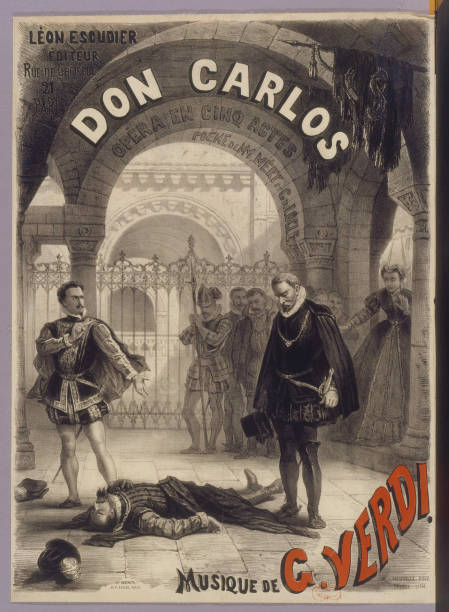
Don Carlos is a five-act grand opera composed by Giuseppe Verdi to a French-language libretto by Joseph Méry and Camille du Locle, based on the dramatic play Don Carlos, Infant von Spanien by Friedrich Schiller. The opera is most often performed in Italian translation, usually under the title Don Carlo. The opera had premiere at Salle Le Peletier (Paris Opéra) on 11 March 1867.
2 notes
·
View notes
Text
Dal 1887 rappresentato solo 8 volte a Genova, il Carlo Felice propone al suo affezionato pubblico una grandiosa coproduzione del Don Carlo di Giuseppe Verdi, con un’apprezzata regia tradizionale di Cesare Lievi. Come il teatro ha dedicato questa messinscena al grande soprano Daniela Dessì prematuramente venuto a mancare, sembra giusto anche a noi dedicare a lei – interprete in passato del ruolo di Elisabetta di Valois sotto la direzione di grandi maestri – questa recensione.
Successo di applausi e acclamazione assoluta per il Grand-Opéra del Bussetano composto tra il 1864 e il 1865 su libretto di Joseph Méry e Camille du Locle tratto dalla tragedia di Friedrich Schiller. Ambientazione storica per il dramma che colpisce il giovane Don Carlo, vittima delle vessazioni della Spagna aristocratica e cattolica di fine cinquecento.
Nell’antefatto (presente come atto I nella versione del ’65 ma eliminato nelle revisioni successive, poi culminate nella soluzione del 1884 ridotta di un atto, passando da cinque a quattro complessivi) Don Carlo, infante di Spagna, incontra Elisabetta di Valois a Fontainebleau e subito se ne innamora corrisposto. Il re di Francia, tuttavia, concede la mano della donna al padre di Carlo, il re di Spagna Filippo II.
Il sipario si alza e ci proietta in un’atmosfera cupa e grave, con la visita di Carlo (Aquiles Machado, tenore) alla tomba dell’omonimo antenato, scenario ricreato grandiosamente e con tale semplicità da rendere elegante e raffinato un luogo di culto come questo: pareti di marmo grigio, corona d’alloro, epigrafe d’oro e pochi inginocchiatoi. Sin da questo momento, l’importanza del coro nell’ottica verdiana di stereofonia (contrasto esterno-interno) è evidente: possiamo sentire lo spirito del radicale cattolicesimo spagnolo dalle voci dei frati che pregano alle spalle dell’avello regale dell’Escorial.
Nel primo atto incontriamo i quattro protagonisti: Carlo, Rodrigo (Franco Vassallo, baritono), Filippo II (Riccardo Zanellato, basso) e Elisabetta (Svetla Vassileva, soprano). Alla vista di quest’ultimi, Carlo è abbattuto dallo sconforto e insieme all’amico Rodrigo decide di far sapere all’amata che il sentimento verso di lei arde ancora. Nella seconda parte siamo proiettati nei giardini in cui sta per giungere Elisabetta. Ci introduce in questo luogo la maestosità del coro femminile con Sotto ai folti, immensi abeti tra cui spiccano la voce della principessa Eboli (Giovanna Casolla, mezzosoprano, che da qui in avanti ci ipnotizzerà con gorgheggi e un perfetto canto immediato de Nei giardin del bello saracin ostello) e quella di Tebaldo (Marika Colasanto,soprano). Il coro è tutto in scena, le dame sono vestite di nero e, come se avessero dei fari atti a dar luce, portano tra le mani dei fiori bianchi. Giunge la regina che, di lì a poco, verrà raggiunta da Rodrigo e da Carlo i quali, duettando Io vengo a domandar grazia alla mia Regina, organizzeranno nei giorni successivi un incontro tra i due amati.
Nel secondo atto la trama si infittisce poiché Carlo ha un incontro con una dama nel duetto Sei tu, bella adorata in cui crede che essa sia Elisabetta ma, invece, è la principessa Eboli, innamorata di lui, la quale, venuta a conoscenza dei veri sentimenti dell’infante, decide di vendicarsi.
Arrivato Rodrigo nel tentativo di placare le ire con la donna nel duetto Che disse mai! Egli delira, la scena si conclude con un complesso e ben orchestrato terzetto Al mio furor sfuggite invano. Ma siamo ormai alla conclusione dell’atto, arrivano Filippo, i ribelli fiamminghi, i frati ed il popolo e in un’eccellente e ipnotica coralità, cantano d’insieme Spuntato ecco il dì d’esultanza (il popolo), quindi Il dì spuntò, dì del terrore (i frati), Schiuse or sieno le porte del tempio! (l’araldo con il coro). E nel finale, dichiarato Rodrigo duca dal re, Filippo, Elisabetta, Rodrigo, Carlo, Tebaldo, i frati, i fiamminghi e il popolo faranno calare il sipario tra tinte rosse di fuoco e d’inferno con Nel posar sul mio capo la corona.
Con il terzo atto, la grande capacità vocale del re viene espressa nella scena Ella giammai m’amò!… Quel core chiuso è a me e, soprattutto, da uno tra i più commoventi cantabili del repertorio operistico, Dormirò sol nel manto mio regal, come dimostra lo scrociare di applausi che segue la conclusione del pezzo.
L’atto si svolge in rapidità con l’arrivo dell’Inquisitore, la scoperta dell’amore tra Carlo ed Elisabetta per colpa di Eboli Gelosa, l’arresto di Carlo considerato sovversivo e la sua scarcerazione grazie all’amico Rodrigo che nella conclusione verrà assassinato morendo poiché Per me giunto è il dì supremo, tra le braccia del fraterno amico.
Ultimo atto, il quarto, chiude l’opera con una soluzione degna di una tragedia. Dinanzi al sepolcro del defunto re Carlo, si ritrovano in una conclusione circolare tutti i personaggi.
Elisabetta prega, Carlo le annuncia che si recherà in Fiandra per affermare gli ideali di libertà, Filippo e il Grande Inquisitore irrompono, credendo i due amanti colpevoli di adulterio accusandoli Per sempre! e con la richiesta di Filippo Io voglio un doppio sacrifizio!. Carlo sta per essere arrestato ma la tomba dell’avo si apre e trascina con sé l’infelice infante.
È senza dubbio un’opera davvero complessa, ma il pubblico risulta affascinato dalla regia attenta e precisa che si sviluppa grazie alla coordinazione delle incredibili e ben progettate scene. C’è precisione descrittiva in ogni elemento, c’è ricchezza di dettagli e coscienza filologica come dimostrano i costumi di Maurizio Balò, espressione della Spagna cinquecentesca. Il cromatismo è il punto focale di costumi, di scene e luci: c’è perfetta attenzione nelle creazioni di contrapposizioni di colori, di luci e di ombre.
Ai cantanti tutti vanno fatti applausi sia per doti canore che per capacità recitativa: tutti i singoli sanno perfettamente muoversi nel vuoto delle scene (presentano tutte infatti ampi spazi di movimento). Per quanto concerne il canto, nulla da sottolineare se non la bravura e la precisazione di tutti i protagonisti, mentre grandiosa la direzione musicale del Maestro Valerio Galli che non sbaglia un colpo (di bacchetta).
«Dormirò sol nel manto mio regal quando la mia giornata è giunta a sera, dormirò sol sotto la vôlta nera là, nell’avello dell’Escurïal»
Filippo II re di Spagna Atto III, Scena I
#gallery-0-3 { margin: auto; } #gallery-0-3 .gallery-item { float: left; margin-top: 10px; text-align: center; width: 14%; } #gallery-0-3 img { border: 2px solid #cfcfcf; } #gallery-0-3 .gallery-caption { margin-left: 0; } /* see gallery_shortcode() in wp-includes/media.php */
Lo spettacolo continua
Teatro Carlo Felice
Passo Eugenio Montale 4, Genova
fino al 2 maggio, ore 15.30
Don Carlo
di Giuseppe Verdi
Grand-Opéra in 4 atti su libretto di Joseph Méry e Camille du Locle
regia di Cesare Lievi
con
Riccardo Zanellato – Filippo II
Aquiles Machado – Don Carlo, Infante di Spagna
Franco Vassallo – Rodrigo, Marchese di Posa
Svetla Vassileva – Elisabetta di Valois
Giovanna Casolla – La principessa Eboli
Marco Spotti – Il Grande Inquisitore
Mariano Buccino – Un frate
Marika Colasanto – Tebaldo
Didier Pieri – Conte di Lerma
Silvia Pantani – Voce dal cielo
Ricardo Crampton, Ettore Kwanghyun Kim, Roberto Maietta, Enrico Marchesini, Stefano Marchisio, Daniele Piscopo, Stefano Rinaldi Miliani – Deputati fiamminghi
direttore d’Orchestra Maestro Valerio Galli
assistente alla regia Ivo Guerra
scene e costumi Maurizio Balò
assistente ai costumi Marianna Carbone
luci Andrea Borelli
Orchestra e Coro del Teatro Carlo Felice
Maestro del Coro Franco Sebastiani
in coproduzione tra Fondazione Teatro Carlo Felice, Fondazione Teatro Regio di Parma e Auditorio de Tenerife Adán Martìn
durata 210′ con intervallo
Don Carlo Dal 1887 rappresentato solo 8 volte a Genova, il Carlo Felice propone al suo affezionato pubblico una grandiosa coproduzione del…
#Aquiles Machado#Camille du Locle#Cesare Lievi#Friedrich Schiller#Giuseppe Verdi#Joseph Méry#Recensione Don Carlo#Riccardo Zanellato
0 notes
Text
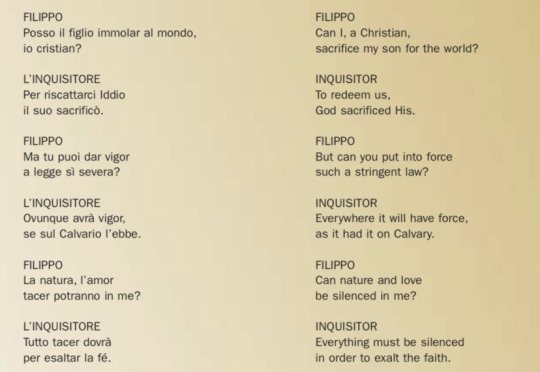
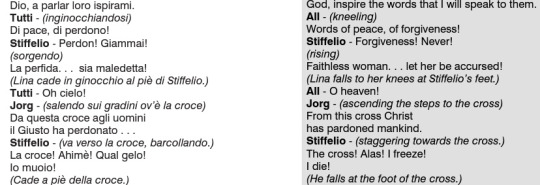

web weaving. very small web weaving, but web weaving nonetheless.
fury and love and faith and different ways of seeing the same thing—for better or for worse.
giuseppe verdi, camille du locle, and joseph méry’s don carlos/giuseppe verdi and francesco maria piave’s stiffelio/fyodor dostoevsky’s the brothers karamazov
#opera tag#opera#books#web weaving#on religion#christianity#on love#don carlos#don carlo#stiffelio#the brothers karamazov#crucifixion#giuseppe verdi#verdi#fyodor dostoyevsky#dostoyevsky#‘savannah why did you not use the original french for don carlos’ because i wanted the text and an english translation side by side sorry#✨parallels✨#words words words
20 notes
·
View notes
Photo

Ce n'est pas l'amour qui porte un bandeau, c'est l'amoureux. Joseph Méry
6 notes
·
View notes
Photo
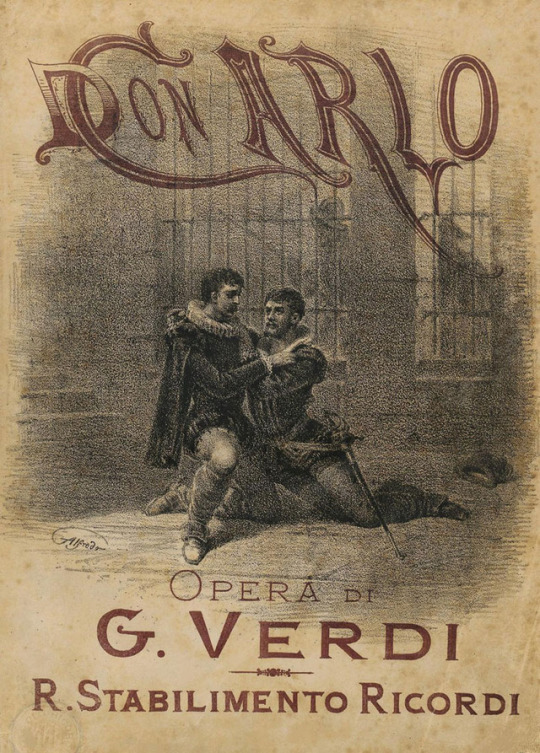
Copertina dello spartito dell’opera Don Carlo su libretto di Joseph Méry e Camille du Locle. Ricordi, Milano 1880. Illustrazione di Alfredo Edel in litografia.
#don carlo#verdi#alfredo edel#book covers#ish#ricordi scores#vintage illustration#dispatches from the opera dumpster#cabinet of queueriosities
134 notes
·
View notes
Text
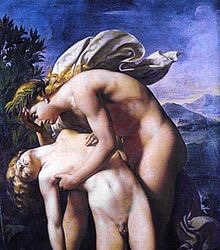
Apollo e Giacinto, dipinto a olio di Méry-Joseph Blondel
1 note
·
View note
Photo

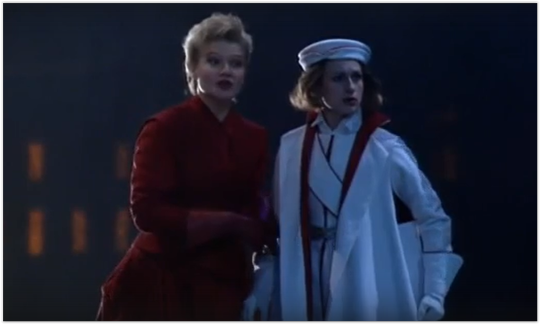
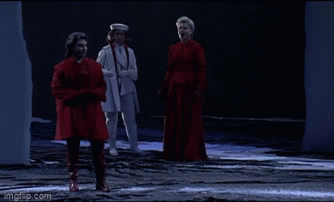
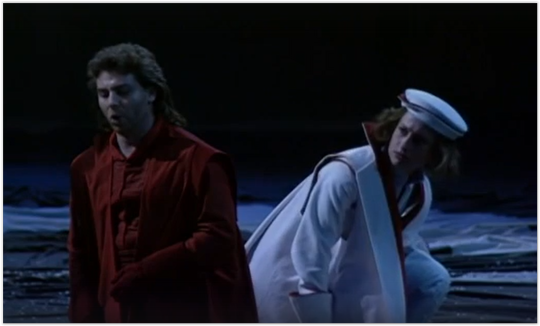


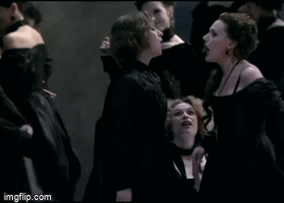
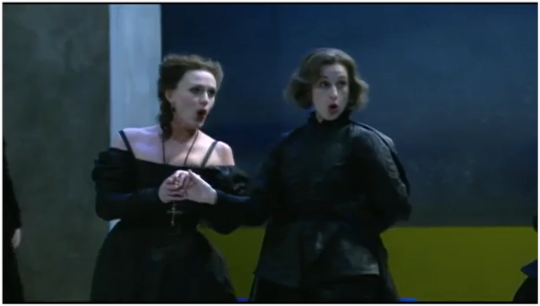
Anat Efrati as Thibault in Verdi’s Don Carlos
(Théâtre du Châtelet, 1996)
#Anat Efrati#Thibault#Don Carlos#Giuseppe Verdi#Joseph Méry#Camille du Locle#soprano#trouser roles#Trouser Tuesday#opera#opera tag#opera gifs
19 notes
·
View notes
Text
Opera Simplified #1: Don Carlo(s)— Notes, Act I
First, a note that covers the entire act: many productions of this opera follow the 1884 Milan version of the opera, which inexplicably cuts the entire first act and moves Carlo’s romanza to the first scene of what in all other versions is the first scene of Act II (it’s also somewhat rewritten and...not great). This is a bad idea for a wide variety of reasons that I don’t have time to get into, but long story short, it messes up a lot of the setting-up of the story. Ignore this act at your own peril.
** Many productions, including the current ROH/Met coproduction, cut the entirety of this scene except for the brief hunters’ chorus. Personally, I am okay with this.
*** The war in question being the Italian War of 1551-1559, aka the Habsburg-Valois War (remember: the royal family of Spain is the Habsburg family; the Valois family in France).
**** Okay, yeah, that’s fair, but just three years later the French Wars of Religion started, and the country wasn’t really done with those until 1598, thirty-six years after they started. So the bright days ahead for France...not so much, ultimately.
***** The treaty being referred to is the Peace of Cateau-Cambrésis, signed in early 1559. Spain officially won but France didn’t get off so badly, and yes, one of the treaty clauses was that Philip II would marry Élisabeth de Valois.
****** Oh, come on, I had to make that reference.
One additional note: much of the writing for this act is taken directly from the Opera Simplified I wrote for this in the summer of 2018, the first act of which you can still find on @carlodivarga-s’ blog.
#opera#opera tag#notes#Don Carlo#Don Carlos#Verdi#Giuseppe Verdi#history#european history#Camille du Locle#Joseph Méry
2 notes
·
View notes
Note
What are some of your favorite operas? I've been interested in opera lately and I'd like some recommendations
oh boy good question actually anon! here’s some of my Personal Favourites (in alphabetical order). i’ve included links to my favourite productions/Whichever Recording Is Available On Youtube
belshazzar
is actually an oratorio (a religious story set to music, which would usually be performed as a concert), but this production has decided that it is, in point of fact, an opera. anyway it’s a bit of a weir one and sticks neither to history nor, really, to the bible story of belshazzar’s feast, but this is one of my favourite productions.
this is one of those modern productions of opera that you see a lot that just looks... truly bizarre, so if you aren’t too into the aesthetic of whatever you’re seeing (belshazzar in the king bart hat from that comic, the general facial expressions of bejun mehta, etc.) just listen to the audio because it’s a good production musically even if i’m not too into all the directing choices. if nothing else it’s a good mine for reaction images.
die entführung aus dem serail
(english title: the abduction from the seraglio.)
anyway, this is really one of those shows that’s just in here because i grew up listening to it, not because i have any great connection to either plot or characters. but one of my earliest memories is listening to singt der grosse bassa lieder in the car with my parents (and trying to figure out how the weird-looking “B” could possibly be an “s” sound), so here it is. it’s an early-ish mozart opera about a guy called belmonte trying to rescue his girlfriend from turkey, and how this plan is foiled by a guy called osmin, until it gets un-foiled. musically it’s good, but character-wise.....nah.
seraglio is........one of those operas that is very much a product of its time and to be honest i wouldn’t suggest it if it didn’t have some really good music. anyway this is an audio recording that i have given you and it’s audio for a reason, because this show is pretty racially insensitive, hence why it is rarely performed, and it is VERY frequently performed in brownface (or with some of the characters in brownface), if it’s performed at all. it contains one of the lowest bass characters (osmin) in the western operatic canon, though, so that’s an interesting fact.
don carlo
i have not been able to shut up, either internally or externally, about don carlo for quite some time, as you have probably noticed. anyway, don carlo is an opera by joseph méry, camille du locle and giuseppe verdi based on a play by schiller called don karlos: infant von spanien, and it is about don carlo. it’s one of those “historical, but don’t actually google the historical figure/s involved because you’ll rapidly discover that they were nothing like this” historical plays/operas, and it’s also the gayest opera out there.
it is about carlos of spain, the son of philip ii of spain, who is the most dramatically disastrous boy ever and i adore him totally. it is also about rodrigo, marquis of posa, and about the spanish inquisition. to be honest this isn’t my favourite production i’ve given you the link to but my favourite is one that you have to sign up to met on demand to watch. if you do, it’s the one with roberto alagna as carlo and with simon keenlyside as rodrigo.
don giovanni
giovanni is the other of my two Current Obsessions (along with don carlo). it’s about an awful man fucking his way into trouble and then trying to fuck his way back out of it again. it’s also about his long-suffering and frankly exceptionally tolerant servant friend boyfriend (leporello and giovanni are dating you can’t change my mind), leporello. leporello is simultaneously in awe of, in love with, and SO COMPLETELY FED UP WITH his master, and he is also one of the most relatable characters in anything, ever, because he’s completely useless.
the recording i have given you is number two, by the way, of my top three dons giovanni (don giovannis? dons giovannis? i don’t know and at this point i’m too scared to ask), along with a met opera production with mariusz kwiecien and luca pisaroni and a salzburg production with ildebrando d’arcangelo and andrea concetti which seems to feature giovanni and leporello sleeping together after fin’chan dal vino. there’s also a production that i haven’t seen (but that @widevibratobitch and i are seeing in summer!) from the royal opera house that is (according to reviews) either infallible or a crime against humanity. it has mariusz kwiecien in it so i will go along with ANYTHING. there are also some lovely audio records on spotify, including an english one in which giovanni sounds like he’s about to scream throughout the show.
iolanthe
back to gilbert and sullivan, which is my original obsession. anyway, iolanthe is... an opera about fairies. that’s the best explanation i could give you for iolanthe without giving away the whole of the plot, because there’s rather a lot going on there that would just be one spoiler after another, and i imagine that you don’t... want that. but basically: strephon is in love with phyllis. phyllis is in love with strephon. the lord chancellor is in love with phyllis. tolloller thinks he’s in love with phyllis. mountararat doesn’t want tolloller to have nice things.
all gilbert and sullivan’s operas were motivated by the political climate of the time that they were written - in the case of iolanthe this was 1881/2 (presumably - it premiered in ‘82 and i refuse to accept that gilbert and sullivan wrote it all in under a year because there’s So Damn Much of it) but there’s really only a couple of things that you truly need to know about victorian london in the late 19th century to appreciate it, and those are that pickfords are a removal firm and that captain sir eyre massey shaw, kcb was captain of london fire brigade at the time it came out. apparently, he was in the front row of the audience on opening night. (also apparently, because i can’t be bothered to provide a citation for this fact, he had an affair.)
ivanhoe
because the ghost of sir arthur seymour sullivan would come back and strangle me if i mentioned two of his comedies but not (what he viewed as) his magnum opus. basically, sullivan didn’t actually want to just be known as “the guy who wrote the music for the political comedies with mr. gilbert”, he wanted to write grand opera. occasionally he got something approaching his way, such as an out of place song here or there like ghost’s high noon in ruddigore, or an out-of-place savoy opera here or there like the yeomen of the guard, but ivanhoe was really the only chance he got to flex his grand opera muscles.
unfortunately for him, it flopped. i have literally never had any interaction with an actual production of ivanhoe; i don’t think there’s ever been a professional revival and amateur productions are equally as scant. i’ve listened to the whole thing all the way through, don’t get me wrong, and it has some nice music, but you can see how somebody going from writing, like, comedic light operas where everybody gets paired off nicely at the end to writing an historical opera set during the crusades wouldn’t go down too well. sorry sullivan.
nabucco
here’s another verdi, but an earlier verdi. anyway, nabucco is kind of a sequel to belshazzar? there’s a line in belshazzar where nitocris says “and a king, in height of all his pride, brought from his throne and from the first of men reduced to brutal rank: all this and more, thou know’st as well as i, and shouldst consider!” basically, nabucco is the story of that king - king nebuchadnezzar. in the biblical accounts he’s belshazzar’s grandfather but he was actually (because he was an historical figure! so was belshazzar! so was cyrus! so might have been nitocris! so probably wasn’t daniel.) something like his great-great-great-great-great-great-(etc.)-grandfather. it also contains va’, pensiero, both one of the most famous operatic chori and also a damning critique of italy and italian politics when nabucco was written.
anyway, king nebuchadnezzar (or nabucco, as he’s known, because this is italian, and also you try rhyming “nebuchadnezzar” with anything) kidnaps the jewish people from their native home and takes them to babylon. he also decides that he’s a god and then proceeds to build an idol to ba’al. i’ve seen the idol just be a straight-up idol in some productions, but the only live nabucco i have seen decided, for some damn reason, to have a GIANT FLOATING ORB IN THE SKY for the idol. it was impressive but fucked up. you know the story from there, because this is the “baritone and bass or bass-baritone cause and then try to uncause problems” genre of opera: nabucco gets struck mad and blind, and his Even Worse Daughter takes over as queen of babylon, throwing her Nice Sister into imprisonment because they’re both in love with the same man. follow nabucco and also a bass as they try to undo his fuckup.
the messiah
and another oratorio, because i cannot and indeed WILL not be stopped. anyway, the link here is to one of those weird Narrative Messiahs (messiae?) that you sometimes see, but it doesn’t really work because the messiah doesn’t really... have a narrative. it’s more of three hours of religious navel-gazing from handel. if i’m honest i’ve only sung in one messiah and i’m not exactly jumping at the opportunity to sing in another messiah, so make of that what you will.
songs you may know include the hallelujah chorus. songs you may like (because i don’t much care for yelling HALLELUJAH! at the top of my voice for three minutes) include the trumpet shall sound and he trusted in god. as i said, messiah doesn’t really have a story so to speak but if you like, you can just view it as a merry romp through Bible Verses You Might Like To Know, because let me tell you: learning the messiah has also caused me to memorise vast swathes of the bible.
the yeomen of the guard
final gilbert and sullivan, so i have an even Two Of Everything, and i really genuinely love the yeomen of the guard. it’s the closest (aside from ivanhoe) that gilbert and sullivan ever got to writing a grand opera, and it has some of their best developed, most interesting, and most realistic characters, and it has some great chori. rather than having two gendered chori like... pretty much every other gilbert and sullivan, except for utopia and grand duke, yeomen has People and Yeomen, who have profoundly different styles of music (the people just sing...ordinary sullivan harmony, which is to say, top to bottom: tune, drone, drone 2: electric boogaloo, chord roots), while the yeomen sing a slightly more complicated four-part male (ttbb) harmony.
all that without describing the plot. basically, it’s commedia dell’arte: you got your lovers, you got your clown, you got your.......other clown, you got your old man, you got your old woman, you got you OTHER old man, you got your young woman. except then it starts to turn all of those archetypes on their heads and subvert some of the norms and expectations that you might have of these people (brave soldier? nah, he’s actually an unrepentant dickhead. Clown Has Depression. one of the young lovers gets forced into an unhappy marriage with a man she doesn’t like. you get it.)
anyway, those (apart from ivanhoe, which i felt obligated to show you) are my favourite operas. if you want something heavier, try going further into verdi. if you STILL want something heavier, try tentatively sticking your toe into the swirling waters of richard wagner. if you fancy something lighter, honestly pretty much any gilbert and sullivan is good for a Rousing Finale (as tom lehrer put it: full of words and fury, signifying nothing). even you want something Lighter Still, might i suggest claudio monteverdi, who had yet to discover the aria when he was writing?
in all seriousness, though, bel canto is a lot easier to listen to than verdi. the earlier you go with opera the less you feel like the music is trying to pin you back against your seat and punch you in the head while you’re listening to it. i can listen to like, mozart, or sullivan, or handel when i’m just hanging out and wandering around the house but if i want to sit down and Truly Concentrate on what i’m going to listen to and ONLY on what i’m listening to i listen to verdi, because late romantic opera is basically the composer grabbing you and yelling “i’ve an opera here that you shan’t escape” and then blasting politics directly into your brain.
honourable mentions that i didn’t want to put in here:
le nozze di figaro
begins with “i must measure” “WHY ARE YOU NOT LOOKING AT MY HAT?!” and just gets More from there.
you may know: sacasm
the barber of seville
fanfiction of nozze, but in opera form.
you may know: figarofigarofigarofigaro
carmen
“arrested for loving my gf on main.”
you may know: TOREADOR, TOREADOR
the mikado
cursed gilbertian racism.
you may know: ego trip (no visuals, because i love being alive)
eugene onegin
it’s a russian classic so there’s too much for me to describe
you may know: this lovely waltz
13 notes
·
View notes